Working at LSE: casual contracts, unpaid wages, unspoken rules, and legal loopholes
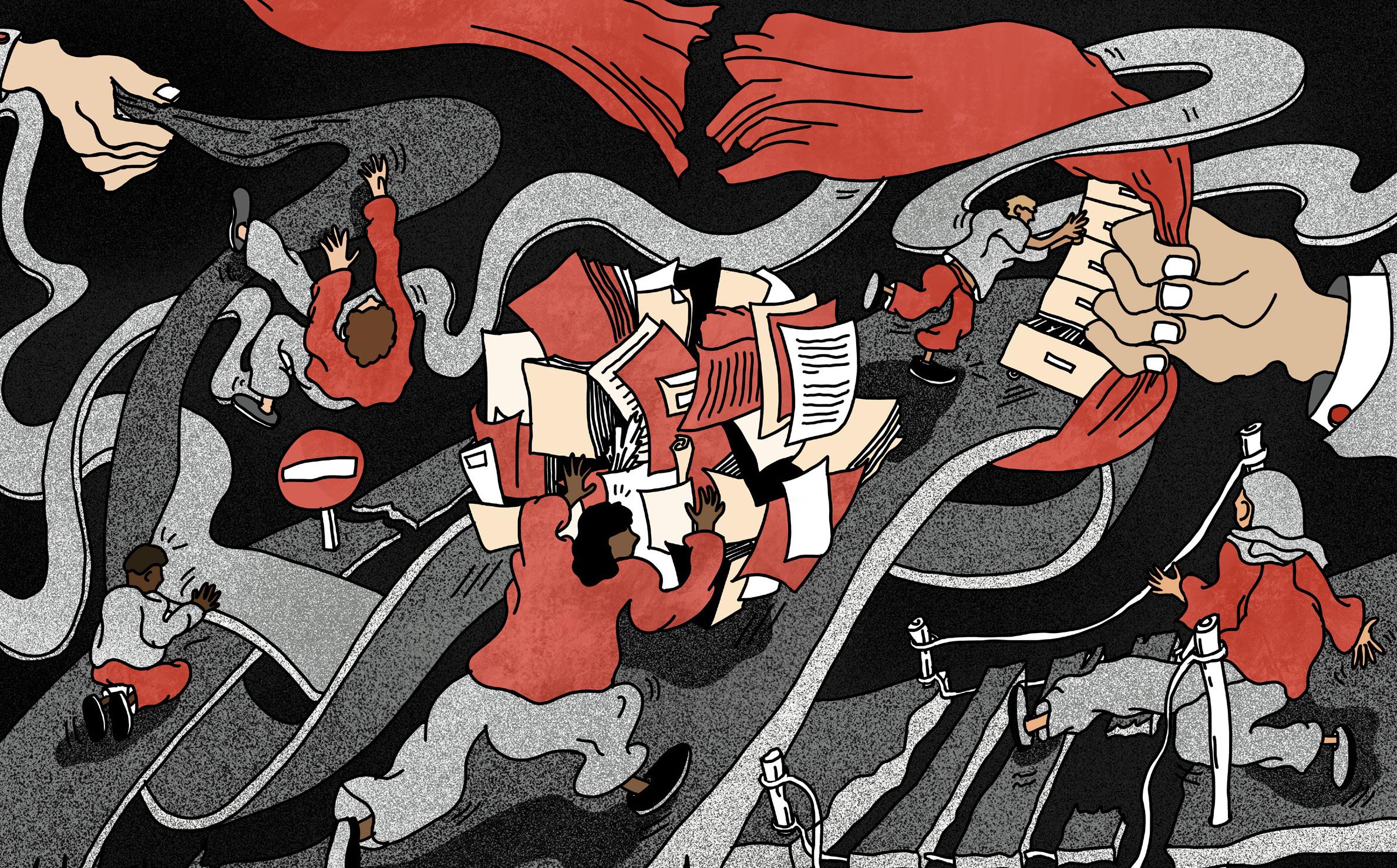
News
China’s “A4 revolution” spreads to London, page 3
Campaign for “Harry’s Law” a er death of Exeter student page 4
Features
LSE students living with long Covid, page 6
Interview with national UCU President, page 17
Opinion
Alan Nemirovski

The exploitation [of workers on casual contracts] is a feature of LSE’s system, not a failure.”
Casual contracts, including “hourly-paid”

contracts, are xedterm contracts o ered by the School to a large proportion of its workforce. ey are also a centrepiece of one of the UCU’s four ghts. However, behind the initial consequences of casualisation, a legal grey


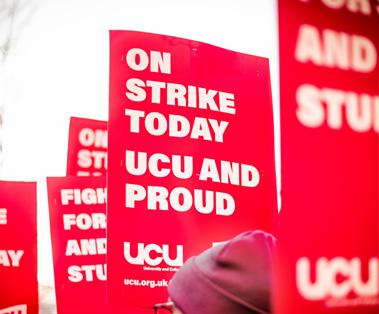
area also creates ambiguity and enables exploitation, which has subsequently permeated across LSE. In this rst article of the “Working at LSE” series, e Beaver investigates the treatment of so-called “casual” workers. is includes teaching assistants
and anyone hired on such casual (or hourly-paid) contracts. Most sta with whom students come in contact regularly are these casual workers.
Continued on page 5
A Very Beaver Christmas, page 15
In defence of LSE, page 11

e Tories are lying to survive, page 13
& WHAT’S ON BEAVER SOUND? See page 14!
&

Newspaper of the LSE Students’ Union: Making Sense of LSE Since 1949 Issue 924 | MT Week 11
Features Editor
INSIDE TODAY
Illustrated by Mithalina Taib
& flip for... ALPHA BOOKS
ALPHA BOOKS
Meet the team
photographed by Claire Oh and Oluchi Egbom
Executive Editor
Aarti Malhotra executive.beaver@lsesu.org
Managing Editor Vani Kant managing.beaver@lsesu.org
Flipside Editor Ambre Pluta editor. ipside@lsesu.org
Beaver Editor Jack Beeching editor.beaver@lsesu.org
Multimedia Editor Vaneeza Jawad multimedia.beaver@lsesu.org
News Editors
Aysha Sarah
Klara Woxstrom

Features Editors

Alan Nemirovski
Bora Bayram
Opinion Editors
Alina Chen
Honour Astill
Part B Editors
Sana Agarwal
Anouk Pardon
Review Editors
Ben Helme
Syed Zaid Ali
Sport Editors
Noah Poll
Alex Bowley
Social Editor
Liv Kessler
Podcast Editors
Lily Whittle
Dillon Loh

Illustration Heads
Charlie To
Anoushka Guli
Photography Heads
Claire Oh
Oluchi Egbom

Videography Head
Jessy Yang
Editorial: We stand in solidarity with LSE UCU
Another academic year, another wave of UCU strikes. ese are the biggest yet: throughout the last week of November, over 70,000 academic and administrative sta led three days of strike action over pay, working conditions, and pension cuts.
UCU members are clearly desperate. From our reporting, we know that sta do not take action lightly; many regret the disruption caused to their students. But their working conditions are our learning conditions. is week’s cover story details just how precarious working at LSE can be. Casualisation, one of the UCU’s ‘four ghts’ particularly a ects junior
sta , who are also those most hurt by pension cuts.
ese strikes are not happening in isolation. e cost-of-living crisis is a ecting workers in every sector, from transport to healthcare. Students are particularly vulnerable. We recognise and share in the frustration at cancelled classes and lectures, particularly among international students, who are subject to exorbitant fees.

Despite this, we feel that disregarding the systemic issues in academia will only have more pronounced repercussions on students and the future of universities in the UK. As UCU President Janet Farrar told e Beaver this
One step at a time
Ambre Pluta Flipside Editor




As everyone is starting to pack their bags to go back home for winter break, or making plans with friends, everything is truly slowing down for the rst time since the beginning of the academic year. We’re all carefully looking back at everything that’s been accomplished so far and everything that has happened.
As this is my nal year, I am really trying to appreciate everything about university. is is the time to breathe in the cold winter air and take in what it means to be twenty-
something. But, as any student knows, there’s always just too many things to do.
is has been a new adventure for me in so many ways. During summer break, as September crept up on all of us, the role that was waiting upon me felt as exciting as daunting. I had seen how my predecessor, Beatriz, had done such an amazing job and I wondered if there was any way that I could even hope to do just as well. Moreover, I had never interviewed anyone before or written articles of the sort. I didn’t know if I would be able to nd people to interview.
week: “We are trying to save higher education”.
We stand in solidarity with LSE UCU.
Signed, e Beaver Editorial Board
Aarti Malhotra, Executive Editor

Alan Nemirovski, Features Editor






Alina Chen, Opinion Editor




Ambre Pluta, Flipside Editor
Anouk Pardon, Part B Editor
Jack Beeching, Beaver Editor
Bora Bayram, Features Editor
Charlie To, Illustrations Editor
Lily Whittle, Podcast Editor
Liv Kessler, Social Editor





Syed Zaid Ali, Review Editor

Vaneeza Jawad, Multimedia Editor





Vani Kant, Managing Editor
Before I returned to London for the start of the academic year, I shared my fears with my mom, and she told me, “Follow the steps, do them one by one and you will get there.” As moms always are, she was right.
My parents have always assured me of one thing, “You will do something great with your life and I am sure of it”. In this editorial, I wish to say to all of you that you will do something great with your life. is can mean di erent things to di erent people; knowing how to go forward with life when you’re twentysomething feels so scary. Taking life one step at a time does seem to be the right way to go
PHOTO OF THE WEEK
submit your best shots of campus to photography.beaver@lsesu.org for a chance to win!
Any opinions expressed herein are those of their respective authors and not necessarily those of the LSE Students’ Union or Beaver Editorial Sta
For more information and rates, contact us at managing.beaver@lsesu.org
MT Week 11 www.thebeaverlse.co.uk 2
Beaver is issued under a Creative Commons license. Attribution necessary. Printed at Ili e Print, Cambridge Room 2.02 Saw Swee Hock Student Centre LSE Students’ Union London WC2A 2AE 020 7955 6705
e
Front page by Vaneeza Jawad
Scan this code on Spotify to listen to the newest Beaver Sound episodes!
ADVERTISE WITH US TODAY!
China’s ‘A4 revolution’ spreads to London and the world
excessive pandemic prevention; ending the zero-Covid policy; the release of protesters; and protecting the human rights enshrined in the Constitution.
On the evening of 27 November, hundreds of people gathered in front of the Chinese Embassy in London to mourn the victims of China’s zero-Covid policy and to express support for the ‘A4 revolution’. Similar protests took place on the same date in cities across the world, including Liverpool, Boston, Osaka and Auckland.
e mourning and protest were directly prompted by the Urumqi re which had occurred three days before. Draconian lockdown rules prevented some residents in a burning building from escaping and delayed re engines. Ten people died in the re.
During the protest, sheets of A4 paper were distributed and held over one’s head. ‘A4’ stands for the protestors’ four demands, which are as follows: allowing public mourning of victims of
e blank ‘A4’ paper also symbolises everything Chinese people want to say yet cannot.
e Beaver was present at the protest. At the door of the embassy, people chanted “Xi Jinping, step down” and “CCP, step down”. Some used loudspeakers to read out black humour poems and voice their protest. Among them, a student who claimed to be born and raised in China said, “I know now what political awakening is: it is a moral awakening.”
e street was quieter opposite the embassy, where candles were lit and shielded from the rain.

An LSE student at the scene, who wished to remain anonymous, said, “I didn’t wear a face mask because I wanted to be responsible for my political stand. Some approached us and suggested we should wear one, as there were people recording the protest
LSE Director hosts rst fully
town hall since pandemic
Alan Nemirovski Features Editor
On 28 November, the LSE Directorate, including various Pro-Directors and Director Minouche Sha k, met with students at the Shaw library for their termly student town hall. is is the rst student town hall hosted in person since the COVID-19 pandemic.
A er a welcome from Director Minouche Sha k, two new members of the LSE Directorate were introduced: Professor Emma McCoy, appointed as Pro-Director (Education) in October 2022, and Dr Mark E Allinson, who was appointed as the rst Director of Student Experience at LSE.
e rst topic raised by students in the town hall was current teacher strikes. e LSE Directorate continued to stress that the strikes are a national issue and that while LSE participates actively, they remain a small actor in national negotiations. When asked about compensation for students due to strikes, Director Sha k commented the School has yet to determine if
in-person
compensation will be distributed this year as they have yet to learn the full impact of the strikes.
e following topic discussed in the town hall was inclusion on campus. e Directorate highlighted the diversity of LSE’s campus and the School’s investment in scholarships to recruit diverse candidates. However, they notably used the term ‘BAME’ (Black, Asian, and Minority Ethnic) to describe LSE’s diversity, despite Sha k herself acknowledging the term is problematic.
When asked about awarding gaps between Black and White students, Sha k did not clarify what the School is doing to address these gaps. She only stated that the gap is closing, but it still varies between departments. McCoy added she is keen to work with other groups and students, to further address this issue, including supporting students from minority ethnic and disadvantaged socio-economic backgrounds.
Subsequent student town halls are expected to continue in-person, on a termly basis.
and the footage would be analysed with face recognition technology. I did see a guy holding his camera at us from 2 metres away – which is unnatural. I didn’t think too much at that point, but now I’m worried they are going to hold my parents responsible for my showing up.”
Chinese students expressed the same fears at a candlelit vigil at LSE on 2 December. ose present were encouraged by organisers to wear black ‘as a sign of mourning’ for victims, and face-masks ‘to protect [their] identities’. In front of the CBG, mourners laid owers and scrawled slogans onto a board. One student told e Beaver “I am attend[ing] to appeal to the government to pay attention to citizens’ real needs and su ering.”
e preceding week, posters and sheets of A4 paper had appeared on campus walls; one student used the microphone at a UCU picket to tell the audience about the ‘revolution’. e vigil was organised via private Telegram groups
and word-of-mouth. Students told e Beaver that they avoided posting publicly to social media for fear of repercussions.
A er a speech from Professor Harriet Evans, the oor was opened to mourners. One student described a lack of academic freedom: they’d felt compelled to ask professors whether their chosen topic was ‘politically safe’ during their studies in Hong Kong. Another student told the audience about a schoolmate who had been imprisoned for sharing a video of protests in Hong Kong. roughout, mourners would break down in tears.
PM considering restrictions on foreign students to curb migration
Aysha Sarah News Editor
On 25 November, e Times reported that foreign students wishing to study in Britain may be denied admission unless they have secured a spot at an “elite university.”
is comes a er the O ce of National Statistics revealed on ursday that net migration to the United Kingdom had reached an all-time high. e surge was partly driven by the record number of 476,000 visas given to international students in the 12 months before September 2022.
e PM’s spokesman said curbs on foreign students taking ‘‘low quality’’ degrees were being considered to reduce the number of international students. Potential plans include limiting the ability of individuals with study visas to bring dependents and cracking down on “low-quality” degrees that do not enhance students’ abilities or future prospects. O cials have reportedly declined to de ne a “low quality” degree or to “pre-empt”
any policy decisions.
e Guardian warned that universities in the UK may go bankrupt if the government reduces the number of foreign students admitted in an e ort to reduce net migration.
University leaders and politicians have defended the contributions of overseas students to research and economic growth in the United Kingdom, as the government considers limiting their numbers in the midst of a rising immigration dispute.
Lord Jo Johnson, a former universities minister, stated that student migration was vital to the United Kingdom’s ‘‘competitiveness as a knowledge economy.’’ He added, ‘‘Without an increase in international students, this country can kiss its status as a scienti c superpower goodbye.’’ According to him, international students not only provide nancing for research in the United Kingdom, but also provide a pipeline of skilled researchers.
News Editors Aysha Sarah Klara Woxström news.beaver@lsesu.org
3
The Beaver Newsroom Photographed by Anonymous
NEWS
Parents push for ‘Harry’s Law’ following death of Exeter student
Aarti Malhotra Executive Editor Klara Woxström News Editor
Content warning: is article discusses sensitive topics such as suicide.
In June 2021, Exeter University student Harry Armstrong Evans took his life a er receiving “devastating” third-year exam marks. His family is now pushing for the adoption of ‘Harry’s Law’, calling for coroners to inform universities when the suicide of an enrolled student is registered, and for universities to release yearly statistics of student suicides.
An inquest into Harry’s death was carried out and concluded on 31 October, which condemned Exeter University for failing to respond to Harry’s demonstrated need for help. e
inquest further stated there was “a risk of further deaths” at the University. e inquest found that the welfare service at Exeter University had not done enough to respond to Harry’s attempts to reach out to the university.
According to e Guardian, Harry is one of 11 Exeter students who have taken their own lives in the past six years. Harry’s family is also urging for the Department of Education to be given the power to investigate universities where suicide rates exceed the national average. e O ce for National Statistics estimated this gure at three deaths per 100,000 students in the academic year ending in 2020.
e parliamentary petition for Harry’s Law has nearly 700 signatures and expires in May of next year.
To garner further support for the petition, Exeter’s student newspaper,
e Exposé, reached out to various other student publications across the UK. As of 2 December, 19 UK student publications have expressed their support for the cause, including e Beaver (LSE), e Oxford Student (Oxford), Palatinate (Durham), Roar News (KCL), and e Saint (St. Andrews).
When asked for data regarding student suicides at LSE, an LSE spokesperson responded, “LSE records the fact that a student has died, but not the cause of death. We would only be aware that a student had died as a result of suicide if noti ed that this was the case by a Coroner’s Court and, as such, we do not hold this information.
e LSE Spokesperson further stated, “On the very sad occasion when a student passes away, for whatever reason, we provide appropriate shortand long-term support to the student’s
Minouche Sha k calls for sustainable investments at COP27
Alan Nemirovki Contributor
On 7 November 2022, LSE Director Minouche Sha k delivered a speech at the opening ceremony of COP27 in Sharm El Sheikh, Egypt, where she discussed the global economy’s future and called for further sustainable investments towards a “green industrial revolution.”

Sha k’s speech was delivered alongside many in uential gures, including President Joe Biden, UN SecretaryGeneral António Guterres, and European Commissioner for Energy Kadri Simson. eir speeches similarly converge on a call for sustainable investments, with Biden and Simson outlining sustainability and investment goals for the United States and the European Union, respectively.
In her speech, Sha k presented a choice between maintaining the current state of unsustainability or evolving towards a “green” future, characterised by the universal use of low-carbon technologies and global cooperation, as opposed to individual solutions for every country. She also noted public sector investment, reducing high debt in developing countries, and the involvement of the private sector as key steps to generate the next revolution
to make global economies more sustainable.
Sha k’s speech has been applauded by the LSE, whose sustainability team tweeted they are “proud” to see the Director speaking at COP27. However, not everyone feels the sentiments and believe that ideals expressed by Sha k in her speech are not re ected on campus.
e largest criticisms by Honour Astill, an LSE student and member of LSE’s Sustainable Futures society, involve the lack of sustainable practices at LSE, the institution that Minouche Sha k leads.
Astill commented,“LSE’s embrace of nance doesn’t square with their purported support for sustainability. LSE engages in high-pro le greenwashing, like becoming the rst
carbon-neutral university in the UK, but doesn’t make meaningful changes on campus, even something as simple as making their disposable cups recyclable.”
A spokesperson for LSE commented on LSE’s sustainable practices, including the School’s sustainable investments, “Creating a sustainable LSE is one of the commitments of LSE’s 2030 strategy. In close partnership with our diverse community, we developed a Sustainability Strategic Plan in 2020, focusing on six key themes to maximise our impact in shaping a sustainable world – including campus operations and sustainable investment.
e LSE spokesperson further stated,
classmates and sta and o er whatever support we can to the family.”
Fiona*, a third year history student said, “We as students are faced with enormous amounts of pressure having to balance classes, coursework, exams, and application deadlines amongst other things. In my case, I also have to juggle a part-time job. Given this, it is not surprising that there is a mental health epidemic across UK universities. Universities are businesses that thrive on the money that students put into their pockets, yet many universities, like LSE, fail to commit su cient resources to support students su ering from poor mental health. e bare minimum that universities could do to help combat this mental health crisis is for them to be transparent by providing statistics on suicide.”
*Names in this article have been changed to preserve anonymity.
“For example, we constantly look at ways to lower our carbon emissions and have pledged to be net-zero carbon by 2050. We aim to have a ‘zero impacts’ campus, actively minimising the environmental impacts of our estate and operations –from waste reduction and water usage to our construction and refurbishment projects.
‘‘LSE’s Catering services take sustainability seriously’’. eir initiatives include ‘‘[promoting] low-carbon, plant-based choices using behavioural science approaches, and [looking] at the whole supply chain through a sustainability lens, from sourcing highquality food items to reducing food waste. Other initiatives include a 25p levy on single-use water bottles and co ee cups, which goes in to funding the Sustainable Projects Fund, and the active promotion of LSE KeepCups at all catering outlets to encourage the use of reusables.
“In terms of sustainable investments, LSE’s Socially Responsible Investment Policy guides our investment practices, taking into consideration Environmental, Social, and Governance (ESG) factors. e policy is currently under review, following a consultation in March 2022 with the LSE community. An updated policy is to be published soon. LSE is also a signatory of the United Nations supported Principles for Responsible Investment.’’
4 News
Photo sourced from LSE
Casual contracts lead to unpaid wages, unspoken rules, and legal loopholes
continued from page 1
Getting a contract
The investigation into casual contracts and labour casualisation begins with Miko ł aj Szafranski, a doctoral candidate at the Law School at LSE. He has spent the last couple of years working as a graduate teaching assistant (GTA) in the Law department. Despite this, he is employed on a fixed-term contract that he only signed
her job offer. The School issues contracts, as opposed to individual departments, which adds a layer of bureaucracy that prolongs the state of uncertainty. For example, Magda recalls agreeing to work as a teaching assistant in the Management Department in May but only receiving her contract in late August.

At LSE Life, some workers faced the same issue whilst trying to renew their contracts. The Beaver spoke to multiple current and former employees at LSE Life,
to remain anonymous for fear of repercussions by their department.
Time allocations
Once a contract has been received by a new (or returning) teaching assistant, their hours are broken down into class teaching, marking hours, office hours, meetings with the course convenor, and lecture attendance if they haven’t taught the module before.
earlier this academic year. Every year, his contract is renewed “completely at the discretion of the department.” Departments also have the same ‘discretion’ to change the number of hours offered in between contracts. This discretion provides power and leverage that submits the employee to the will of the department.
The conversation with Miko ł aj led to Magda Muter. For Magda, her experience has been largely similar. She worked as a teaching assistant across the Departments of Methodology and Management and was a PhD representative for the Department of Gender Studies. Between departments, she noted disparate working environments, conditions, and treatment of staff.
According to Magda, when you work in departments outside your own, “you don’t know anything about the contract before you see it.”
She says she had agreed to work as a teaching assistant at LSE without knowing the exact terms of her contracts — simply because the contracts were not issued by the time she had to (verbally) accept
most of whom preferred to remain anonymous. Some received their contracts more than five weeks late, “at the beginning or middle of October.” However, this delay was more puzzling for them because there was no explicit change to their contracts, aside from a single paragraph confirming that their contracts were being renewed (as opposed to their contracts drafted from scratch). “Then you sign your contract that you were supposed to sign [a while ago],” explains Olivia Nantermoz, a PhD student working at LSE Life.
During this limbo between agreeing to work and getting her contract, Magda didn’t know how many hours she would work. This, too, would not be communicated to her until she received the contract with the working hours already allocated to her by the department she is working for. “To ask [for certain hours in advance] is already an act of bravery,” Magda explains, because working hours are not simply given to her. Additionally, there are lingering anxieties about losing one’s job if one asks too many questions. Indeed, some interviewees preferred
Still, certain time allocations remain unrealistic. “Effectively, I am placed on a schedule where I mark an essay in 20 minutes, which includes giving feedback,” says Miko ł aj. If a teacher needs more than 20 minutes to mark an essay and provide meaningful feedback, they will need to work past their allocated hours — these extra hours are not paid. The result is a gradual decrease in your hourly rate for every additional hour of extra work. Across departments, it’s unclear how many hours you will need to work. In Magda’s experience, “You don’t know how much time things like marking take.”
“And this [how much you are paid for actual hours worked] is the real difference between departments.”
Compensation after working
However, even after working extended hours and potentially being underpaid, some casual workers risk never seeing part of their wages. Bluntly, “Sometimes they [LSE] forget to pay you.” LSE’s Human Resources (HR) department has been described as “dysfunctional” by an interviewee.
Interviewees described a tension between themselves, their managers, and HR where you would not get paid unless you were persistent. Even if a worker finds out they have
been underpaid, that money is not always returned right away. “They only pay you [a certain amount] quickly,” and the rest (or all of) the amount gets rolled over to the next month’s paycheque, adding to further delays in receiving compensation. This problem is not confined to any single department either. One interviewee described her experience as a Subwarden working for LSE’s Residential team. Despite receiving a promotion, her pay was not adjusted for months after she started working due to consistent silence and delays from LSE HR.
An LSE spokesperson commented on the actions LSE HR takes in such cases: “In the occasional event that a payment is missed for a casual or hourly worker (for example, if the hours worked are confirmed late during a particular payment period), mechanisms are in place for any oversight to be rectified as quickly as possible (e.g. via BACS payment outside LSE’s usual pay run).”
However, this was not always the fault of LSE HR — sometimes, the problem remained as simple as a manager who forgot to submit a timesheet. One interviewee described how some managers seem resistant to changing
their processes to avoid such errors.
Managerial discretion and power
Such managers sometimes make or break the working environment. “At the end of the day, the contract puts us at the mercy of managers,” clarifies Zoe*. When she was working as a GTA in an academic department at LSE, “maybe some people had trouble with their contracts, but they were a lot easier to deal with.”
Conversely, at LSE Life, “there is no professional respect for what we do,” according to an interviewee. Workers are treated differently because of their contracts. Whilst contract reform could help in the short term, “[some workers] aren’t entitled to anything.” This was especially prevalent during the COVID-19 pandemic when workers required funding for equipment to work efficiently from home — funding that LSE Life provided to permanent staff but not to fixed-term staff.
“At the end of the day, these contracts do nothing to protect us — according to HR, they’re budgetary guidelines for the managers, that is all. They don’t guarantee us
Features Editors Bora Bayram Alan Nemirovski features.beaver@lsesu.org FEATURES
5
“[Departmental] discretion provides power and leverage that submits the employee to the will of the department.”
“And this [how much you are paid for actual hours worked] is the real difference between departments.”
Unspoken rules and uncertainty
From the start of the investigation, Miko ł aj mentioned other “unspoken rules that govern GTA contracts.” Silent hierarchies are a constant across departments, but other rules vary. On one end, Miko ł aj notes oddities such as: “No grade should end with the last digit being nine” when marking because students are more likely to appeal it.
Magda criticises more consequential rules, such as hourly pay rises only being offered to workers who work consecutive years. Magda taught at LSE in her 1st, 3rd, 5th and 6th year of PhD. Yet, she only got her first incremental increase after year 5. These rules are sparsely communicated and are simply encountered as someone progresses through their employment, usually thanks to informal talks with other class teachers.
Legal ambiguities of hourly-paid contracts
This, and more, remains the direct result of casual
“
contracts. Officially, LSE labels their part-time, temporary contract as “hourly-paid contracts.” While personally trying to investigate her contract structure, Olivia could not find a legal framework for this contract type. Her only conclusion was that “the terms of the contract are, in effect, a zero-hour contract, but LSE refuses to call it that.” However, these are not permanent part-time contracts either. In an email from LSE HR obtained by The Beaver, they referred to hourly-paid contracts as consisting of “variable hours, [where] the hours are not guaranteed and may go up or down.” Any average number of hours “promised” on any hourly-paid contract are merely “an expected average,” as opposed to a guaranteed number of working hours.
This contract type appears similar to the UK government’s definition of a zero-hour contract due to the lack of guaranteed hours and variability “based on the needs from [LSE’s] departments.” Still, when The Beaver submitted a Freedom of Information request to LSE asking for information on zero-hour contract usage at the School, the School refused to provide any information
because, technically, they assert their temporary, hourly-paid contracts are not zero-hour contracts.
An LSE spokesperson commented on the use of hourly-paid contracts, stating: “LSE uses hourlypaid contracts for individuals undertaking certain temporary work where the nature of the work can mean that hours can vary regularly. All hourly-paid contracts for individuals are issued terms and conditions of employment and are entitled to the same contractual benefits as salaried members of staff.”
The big picture of casualisation at LSE
Casualisation remains a focal point in labour disputes at LSE. In a student town hall on 28 November, Professor Eric Neumayer, Pro-Director (Planning and Resources), commented on behalf of the LSE Directorate, claiming that there has been a reduction in casualisation at LSE in recent years. He elaborated that this is being done through schemes such as education career tracks, and improved funding of LSE’s PhD studentships. However, statistics published by the UCU paint a completely different picture. The statistics
point to LSE as a predominant user of fixed-term or casual labour; in 2020/21, 59% of LSE’s academic staff was on fixed-term (casual/hourlypaid) contracts, up by 12% since 2014/15. This was simultaneously met with an 18% decrease in permanent staff during the same time period.
Nonetheless, these contracts mean students can lose out on the world-class teaching LSE consistently promises to deliver. The result is that “the quality of education will only depend on the best effort of the individual teacher,” says Miko ł aj. The quality of education and services delivered by casual workers — teachers, advisors, and more — is, thus, variable at best.
As a result, students will continue to suffer so long as the teachers and workers with whom they regularly interact suffer. This is not to say that most teachers and workers don’t want to help students and enjoy their professions because most of them thoroughly enjoy their professions. Their positions under these unstable contracts, however, make them prioritise self-survival above all — which means they cannot dedicate their energy to students, no matter how much they’d like to.
Casual contracts are the first in a list of problems with LSE’s working conditions and culture. Further articles of the ‘Working at LSE’ series
Hear from a teacher at LSE in the new ‘Working at LSE’ companion podcast!

Scan the QR code below to listen:
 Vanessa Huang Staff Writer
Illustrated by Lamisa Chowdhury
Vanessa Huang Staff Writer
Illustrated by Lamisa Chowdhury
Despite the estimated 2.2 million people in the UK that have long Covid, it is, in many ways, a hidden illness. ere are the people who don’t know they have it, continuing to struggle with energy and cognitive function but never associating these with long Covid. ere are the people that minimise their symptoms due to stigma and misinformation. en there are the people that cannot hide it – those with symptoms so debilitating they are themselves hidden from society, disappearing from work, school, and social events.
And when we don’t see long Covid, it’s easy to forget about it. I spoke to two students and Covid long-haulers, as they describe themselves, who feel they’ve been le behind and let down in every possible way.
Alice*, who is currently completing a masters in Philosophy, contracted Covid in January of this year, thinking at rst that it was a bad sinus infection. She already had asthma, but it was never bad enough that she needed an inhaler. She was now “using this reliever inhaler ten times every four hours” and couldn’t speak or swallow either. is “horrendous su ering” eased a er a week or two and she started experiencing more signi cant improvements a er a
month. But then new symptoms started appearing, di erent from the ones she initially had.
Maya* recently graduated with a Masters in Economics. She contracted Covid at a similar time, in mid-December 2021. She had a mild infection: chills, a stu y nose, and a strange feeling in her head. She wasn’t worried – it seemed like everyone around her was coming down with Covid then. She was also vaccinated, t and healthy. Her symptoms cleared within four days and she was out of self-isolation in time to celebrate christmas. “Little did i know this infection would soon turn my whole life upside down,” she says. Like Alice, symptoms began popping up again. She was ying home to
see her family a er January exams when she was hit by a spell of chest pain, dizziness, and nausea. She’s had symptoms ever since.
Post-Covid syndrome, also known as “long Covid”, o cially refers to the existence of Covid symptoms more than four weeks a er infection. ere’s an enormous list of common symptoms: fatigue, shortness of breath, loss of smell, muscle weakness, brain fog, chest pain, heart palpitations, and more. Alice and maya have each experienced most, if not all of these.
Fatigue is one of the particularly misunderstood symptoms. It’s a term so broad that it can be mistakenly applied to normal variations in functioning. Unlike the tiredness that’s alleviated with a nap or a good night’s sleep, the fatigue longhaulers experience doesn’t go away even when they’re resting or sleeping more than usual. Fatigue also doesn’t just mean cutting out the most energyintensive activities in your life. Speaking, watching tv, breathing, and eating – these all require energy.
Features
e more you ght against it, the worse you get”: Students living with long Covid
6
anything.”
“And when we don’t see long Covid, it’s easy to forget about it.”
But perhaps the most punitive of symptoms is post-exertional malaise. Conventional wisdom suggests the more you practice something, the easier it gets. Long Covid throws all that out the window. With postexertional malaise, increased exertion doesn’t just fail to bring about any improvements in symptoms – it exacerbates them. As Alice puts it: “the more you ght against it, the worse you get.” ese “crashes” can last days, weeks, or even months. Sometimes, the e ects are permanent.
Alice experienced postexertional malaise for herself when she attended a conference in Oxford. “I was doing too much: walking, climbing stairs, using my cognitive function,” she says. “I just did so much that on the second day i felt awful. I couldn’t stand. I didn’t know where i was going.”
Out of the more than two million in the UK that have long Covid, only 23,273 have a formal diagnosis. Maya received hers a er two months; Alice hasn’t had any kind of medical acknowledgement yet. e biggest challenge she’s faced is getting doctors to believe her. “ e routine exams that we get done don’t show that something is wrong, so a couple did come out abnormal but most came out normal,” she says. “And it was just doctors gaslighting me, saying, ‘oh, the exams don’t show anything.’” e lack of an established physical
biomarker for long Covid means doctors look at patients’ descriptions of their symptoms and conduct tests to rule out other potential illnesses. But symptoms that are di cult to observe from the outside are also easily psychologised, blamed on stress or anxiety.

Alice has seen cardiologists, neurologists, psychiatrists, and pulmonologists. None of them have given her any answers.
On the other hand, having a diagnosis doesn’t necessarily eliminate any uncertainty.
“I’ve seen so many doctors and specialists, but none of them have been able to help me,” Maya explains. “All they keep on saying is that i need to rest and be patient until we have some kind of treatment.”
Research indeed hasn’t yet determined any viable treatments. e NHS has invested £90 million to establish long covid clinics, designed to serve as “one stop shops” for long-haulers. But these clinics are plagued by long waiting times and treatment tends to consist of suggestions to try cognitive behavioural therapy. Some doctors are also still keen to suggest increasing levels of exercise, blaming any loss of function on “deconditioning.”
In the absence of comprehensive medical support, long-haulers have to adapt to recovery that’s non-linear, with symptoms that o en shi and uctuate. Both Alice and Maya moved back
home a er nding it impossible to manage on their own. Maya pushed through the remainder of her degree, completing it in june. She spent her days at home, trying to balance watching online lectures with resting. She also received extra time in her summer exams, something she credits with mitigating the e ects of her brain fog. is additional exertion, however, took its toll: “I felt really ill the whole time and my health de nitely further deteriorated due to not being able to rest, so looking back it wasn’t a good thing for my health and i’m not sure i’d do it again that way.”
Alice, too, completed her teaching in lent term. But submitting her assessments in the summer was inconceivable and she deferred them all to January 2023. She returned to London in September – her condition had improved and she was feeling optimistic. We had a Zoom call at the start of term where she was tired but altogether doing better than she had in a long time. By November she had relapsed, badly. Even looking at a screen was too taxing – the little energy she had was just enough to send me ten minutes of voice messages.
Alice is now hoping to defer her assessments again. She doesn’t know if her request will be approved – they’re assessed on a case-by-case basis and the success of her rst request doesn’t mean anything for her second. What she does know is that if this deferral is granted, it’s the last one she’ll get. LSE policy sets a maximum period of registration for all taught degrees: for a Masters degree, it’s two years. If she can’t complete her assessments before the prescribed deadlines, with another deferral or otherwise, she’ll be leaving LSE a er more than a year of pushing herself to the limit, with neither a degree nor the possibility of returning to complete it. She’s trying to do as much work as she can, but the more she pushes herself the more function she loses. “I’m scared of not being able to sit up, not being able to eat, not being able to shower,” she says. “ at’s what’s at stake.”
Long-haulers navigating these challenges without any support are going through an incredibly solitary experience. “It’s really hard to keep your friends and make new friends,” Alice tells me. When she meets new people, they rarely seem to understand what long Covid is, making comments like “what’s that? Have you got Covid right now? Stay away from me.” She believes there’s also an excessive focus on mortality in conversations about Covid. Mortality rates have fallen and the general sentiment has accordingly shi ed: Covid is, decidedly, a thing of the past. She points out how there seems to be this illusion of infallibility when it comes to Covid – we never imagine we could be the ones su ering from a “disabling illness that can render [us] ill for months to years.”
Faced with these constant frustrations, long-haulers have built their own support networks, where community and self-advocacy are central. Support groups have become critical sources of information, not just for their members, but
for a wider scienti c community that’s still coming to terms with this newly-developing illness. One in particular, ‘longcovidsos’, presented information to the World Health Organisation, while the Centres for Disease Control and Prevention in the US based its guidelines on longhaulers’ rsthand experiences.
Alice founded a long Covid support group here at LSE. eir rst meeting was poorly advertised, shared just the night before, yet still attracted seven attendees. ey got together and shared their knowledge, suggesting di erent specialists and talking about meditations they’ve found helpful for stress. “ ese were the only people that got me,” alice says.
is is far from the rst time a chronic illness has been maligned, and it’s unlikely to be the last. But there will always be a collective of long-haulers, surviving through sheer resilience, using what little energy they have to further our understanding and make things a little easier for people newly disabled by Covid. It’s time we
Features 7
“Having a diagnosis doesn’t necessarily eliminate any uncertainty. ‘I’ve seen so many doctors and specialists, but none of them have been able to help me,’ Maya explains.”
“Long-haulers navigating these challenges without any support are going through an incredibly solitary experience. “It’s really hard to keep your friends and make new friends,” Alice tells me. ... When she meets new people, they rarely seem to understand what long Covid is.”
“Research indeed hasn’t yet determined any viable treatments. ... But these [long Covid] clinics are plagued by long waiting times and treatment tends to consist of suggestions to try cognitive behavioural therapy.”
SU jobs: what are they like?
Javier Romero Staff Writer
With in ation at a decades-long high of 11.1%, and London currently being the 15th most expensive city to live in, many students are turning to parttime work. Getting a job is o en easier said than done, however, especially for those with little experience. Moreover, not all jobs are equal and with the cost of living increasing at its fastest rate in 40 years, students can hardly be blamed for balking at the notion of juggling long hours with little pay alongside university.
Where, then should cashstrapped LSE students look for that rare thing: an accessible job that is well-paid without being too demanding? A good place to start may be no further than campus itself, with the Students’ Union o ering a wide range of jobs, from bartenders to receptionists. To see what it is like to work, e Beaver decided to interview the students with SU jobs to nd out.
All the interviewees, holding di erent positions, reported being paid a ‘London Living Wage’, which is currently at £11.95 an hour, almost three pounds higher than minimum wage. Considering the average UK salary for full time employees is £16.37, the pay is good. Luzia Kirschbaum, a third-year Politics and International Relations Student working on the fourth oor of the SU building described it as “a generous amount.”
Granted, it may not spell the end of all nancial woes, but it does help, says Carmen Lau, a third-year student who works the SU reception on the third oor. She explained, “this is just a little bit extra, just for the cost of going out and paying the groceries and paying o one, two odd utility bills and stu , which does cover it.” More importantly, all SU jobs possess a exibility many students prize as highly as the pay.
As Luzia elaborated: “At the start of every month they ask us ok, tell us what dates you want to work at, and then they book
you in if you’re rst basically. So [it’s] super exible… if you can’t make it. It’s a zero-hour contract, so if you can’t make it, you get less money but you don’t get penalised for it.”
is rst-come, rstserved approach may cause competition for shi s, but it also allows students to manage the workload on their own terms. Indeed, a supportive attitude from management seemed to be a recurring theme in the interviews. Harriet Sparling, who works as a Sports and Recreation Assistant at the Marshall building and has since become an AU exec explains: “they get that you’re students as well, so obviously they expect a certain level of standards but of course, they understand that stu comes up like deadlines and are very understanding.”
e convenience factor of working an SU job also stretches beyond being able to set your own hours. Firstly, the fact that students’ workplaces are located on campus means the commute to study and to work
is one and the same, something students like So a Moran, who lives at home and works at the LSE Merchandise Shop, really appreciates. “Coming into campus for a one-hour class is kind of sad and pointless, so I nd if I’m able to do a two hour shi as well on top of that, that’s just another bene t.”
Furthermore, getting on with university work during the quiet hours—speci cally in reception jobs—is widespread and allowed by management, whereas, as Carmen admitted “other jobs might not provide that luxury.”
At its best, an SU job o ers a relaxed, friendly environment in which to work, one that may even be fun. is was best described by Defne Atadan, who works at LSE’s student bar, e ree Tuns. Speaking on the chances she gets to talk to her coworkers behind the bar, Defne remarked, “I think Tuns people work much closer together to each other maybe because of that, like they’re actually my friends now, I didn’t
know any of them before.”
Student Union jobs, however, are certainly not easy. e application process is competitive and most that get jobs apply early, usually the summer before term starts. Students spoke of the slow vehour shi s as much as they did of the fun or busy ones and regardless of exibility, juggling student life with work takes real commitment.
Yet overall, SU jobs really do seem to possess a variety of factors that make them appealing to students, especially compared to others, as students with previous work experience—like Harriet— can attest: “I think this is a lot less stressful than a typical job, there’s not half as much pressure.”
So what advice can we o er to would-be student workers? A fresh twist on an old classic— there’s no place like campus.
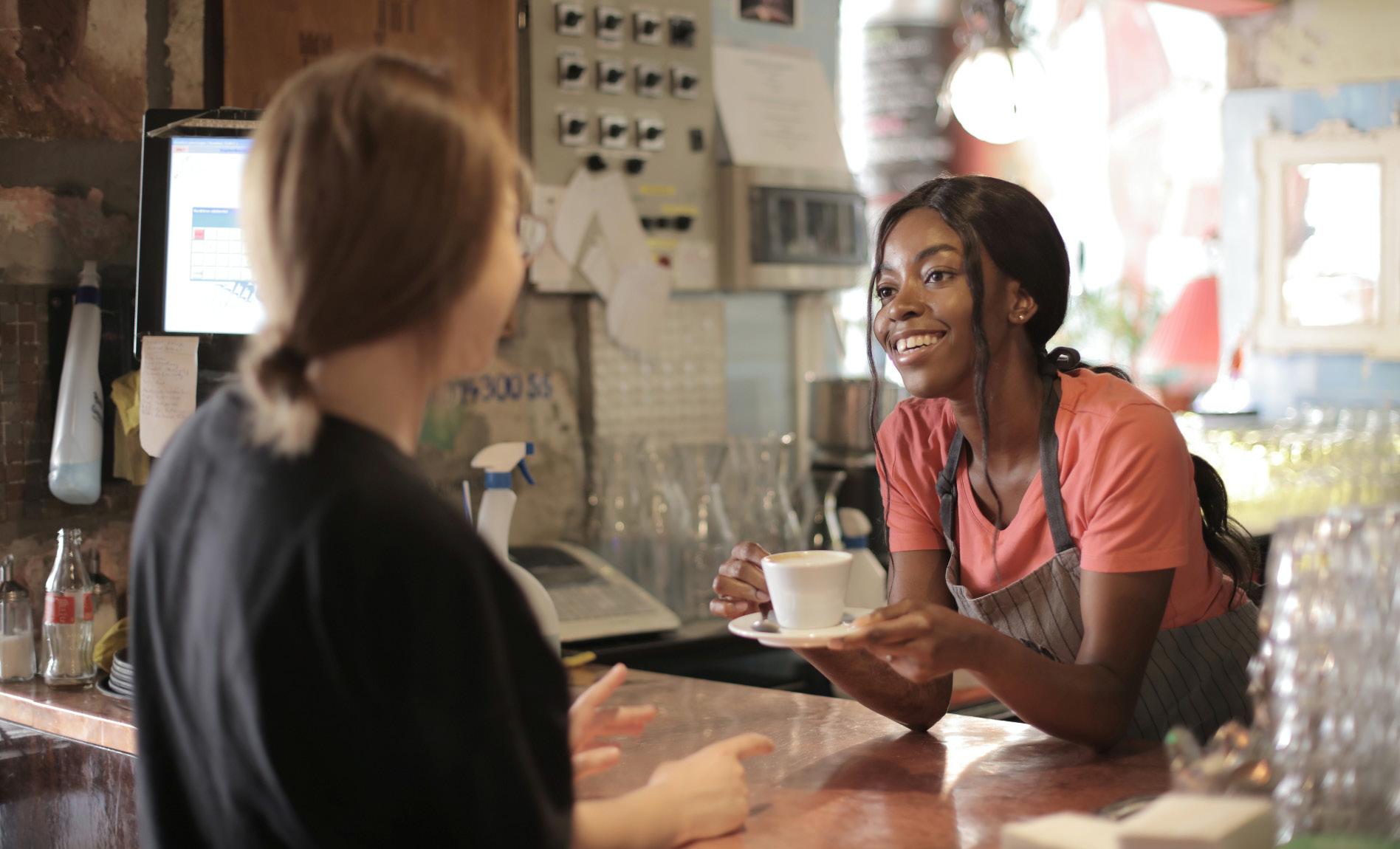
Features 8
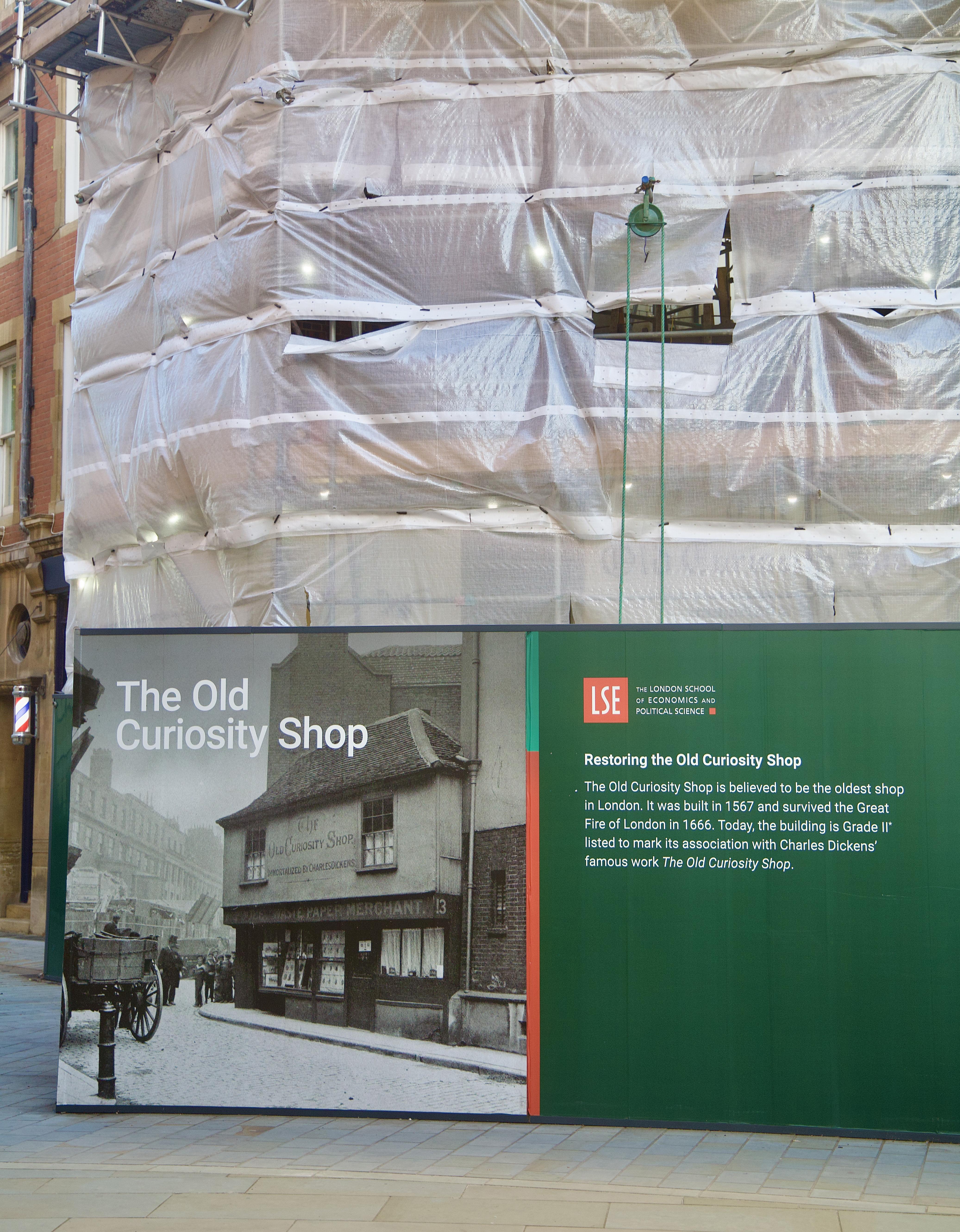

OPINION
Old Snogger's Diary
Stevan Balac Contributor
Illustrated by Iga Jasinka
Harvey Delauney Snogglesworth, President-At-Large of LSE Conservative Society, gives a quaint yet vivid portrayal of life on Houghton Street through extracts from his diary (written daily on the benches outside the Marshall Building, Lincoln’s Inn side, at 3.30 p.m.coincidentally when Pole Fitness hold their intermediate training sessions). As a bright young thing in the Conservative Party, he heartily engages in student politics and has ambitions of one day becoming a big hitter in British political media. This week, President Snogglesworth welcomes in the new cohort of Conservative Society members, manages to quell tensions with the Students’ Union, and avoids a dangerous delve into Russian geopolitics after a saucy dinner date in Mayfair…
Monday 26 September
Ahhh, the sweet smell of a new academic year here at LSE.
It's been a trying summer. Old Snogger’s Kensington pad recently fell through after Natasha’s father was extradited back to Bulgaria on completely bogus charges (those raspberry pickers were paid a damned fair wage, and I’ll not hear anything otherwise). So that leaves me renting a shoebox in the second year stomping ground of Bloomsbury before Dad gets his act together and takes the job at Lloyds. Que Sera Sera, as the bloke that cleaned the toilets at Rosebery used to say – that's life kiddo. Onto the next chapter.
The internship with Rees-Mogg went up the Swanny as well – lost out again to UCL’s Tory prez, Giles H. Gobswallower – so I settled for a guest-spot on GB News every weekday at 11 p.m. No pay, I’m afraid, but damn good for the old mèdia de social. In fact, I was retweeted by none other than Laurence Fox just the other week. Soooo… the plan is to settle for a reasonable, low stress-high dosh
job post-uni with Dad whilst I get my life together, all the while building up a following until I can appear on Farage at the primetime 7 p.m. slot.
Tuesday 27 September
'Hell hath no fury… like a libtard scorned…’
Particularly those of the nose ringed, dyed hair variety that frequent the committee of a certain Students' Union at LSE. Sophie, the esteemed General Secretary, was far too nosey with the ConSoc accounts, so now our own treasurer Argentinian Steve has to explain away the 12 cases of Port we claimed reimbursements for at the last Christmas do. You never see them giving Labour Soc shit for the green tea expenses at their LGBT therapy sessions, or whatever the hell it is they do.
No matter – I gave her the Ol’ Snoggers charm and managed to have it struck from the record. God I’m handsome. God she fancies me.

Finished up by 12 p.m. so time for a quick one in George IV before lunch with Tash. Then fired off a few tweets I wrote yesterday about pronouns and people in dinghies, and drifted into a lovely afternoon nap listening to the gentle ping of all those likes and retweets.
I love this game.
Wednesday 28 September
A big day. Tonight’s our inaugural Welcome Drinks for prospective Tory Soc members. It's always a nice venue, we prefer the National Liberal Club, and generally like to chuck a grand or so behind the bar for Prosecco and cigars
from last year's membership coffers. The spotty gimps that actually follow politics usually congregate in one corner, talking about – God knows, macroeconomic inflation or something – whilst me and the chaps try and corner the new girls.
The usual craic is to ignore the freshers and try and pull the Masters students, especially the French ones, but this year I’m
the races.
Thursday 29 September
Fuck me. Monumental headache–puked a perfectly formed Big Mac back up into the sink when I got in last night. And had to delete some rather incriminating drunken images from the Society Instagram of a certain South American Steven sodomising the statue of Gladstone in the Dining Room. Thankfully the tie round his head obscured his likeness from the general public, and I like to think old Gladstone, as a Liberal after all, would have approved of such adventurous gymnastic feats were he alive today.
Speaking of which, I was just about to despair that this was about the only sodomy that did occur last night when I awoke to a Insta DM from a certain ‘Katarina’, Russian Economics postgrad par excellence, and heir to a rather hefty gas pipeline empire. Managed to decipher the previous messages from last night and it seems not only did we mingle at the welcome drinks, but I’ve managed to wrangle myself a date…tapas in Mayfair tomorrow.
Hangover cures, anyone?
Anyway, there was I thinking I could use my usual game and cunningly weasel my way back to hers – as is customary for Ol’ Snoggers – or at the very least have a few flirty drinks and some slap-up Spanish tucker.
But the more I (like a gentleman) asked about her life, the quicker it became obvious that her family business dabbles into a rather wide array of industries. Some of them not so much fossil fuels as firearms – bloody big ones. The type that fly through the air with a skull and crossbones stamped in fluorescent green on the side (hence, I gathered, the need for a security guard from the Neolithic Age). The same one who, just as the wine was flowing and Kat and I leaned in for a candlelit kiss, grabbed me by the scruff of the Ralph Lauren and unceremoniously dragged me across the room – forks, flowers, and chorizo flying everywhere.
Chucked out into the street with a black eye and bloody shirt, I ran as far as my little legs could carry me. Specifically to the nearest off-licence, grabbed a bottle of Smirnoff and a packet of Marlborough reds, and slunk away into the London night.
I’ll stick to the French next time.
behave myself and put on a professional front now that I’m El Presidente.
Around 9 p.m. we have a disgraced former backbencher come and do a speech, usually already half-cut, so the trick is get the Insta pics done quickly and get them stumbled out the door into a cab before they start getting a bit too ‘friendly’ with the waitresses. Anyway, off to Angelo’s to get the hair freshly curtained, pick up the suit from the dry cleaners and we’re off to
Saturday 1 October
Well cover me in shit and call me a Socialist; that's the last time I date anyone without researching their family WELL in advance. I suppose, in retrospect, the first clue was the bald 6’5” gorilla, complete with Terminator sunglasses and earpiece, who chaperoned her to the table and stood in the corner of the restaurant, hands folded.
Join us next time as President Snogglesworth makes his termly pilgrimage north to visit his chums in Cambridge – the heartland of Toryism – where he participates in a debate with their Conservative society, and is forced into a compromising position involving a toffee apple during a Rugby initiation ceremony…
10
Opinion Editor Honour Astill Alina Chen opinion.beaver@lsesu.org
LSE is not the ultimate evil
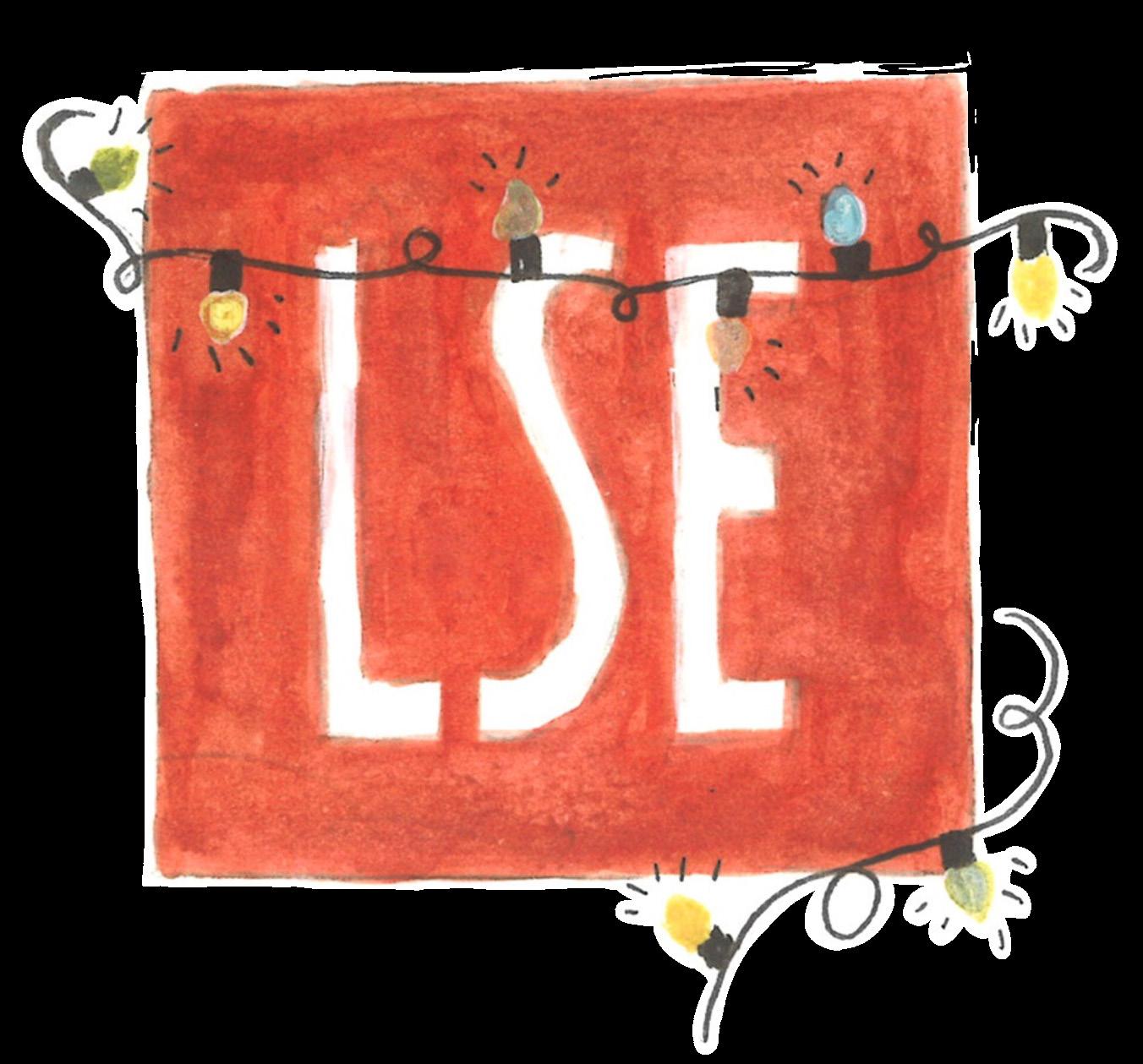 Alina Chen Opinion Editor
Illustrated by Noora Belcaid
Alina Chen Opinion Editor
Illustrated by Noora Belcaid

At e Beaver, we are ooded by criticisms about LSE. It never stops: from toxic academic pressure to disastrous mental health support, e Beaver has a unique insight into the myriad of other student complaints the School’s management fails to attend to. I remember sitting around the table in the Media Centre at one of our meetings, re ecting on the noticeable lack of complimentary or at the very least approving articles about LSE. As a third-year student, I wonder: has life at LSE genuinely been all that bad? So much so that we have not had a single positive account of the student experience in the university newspaper? is article, then, could be a rst.
I wrote this article a er leaving my philosophy class on a random Tuesday evening. Walking down a rain-soaked
Kingsway where the Christmas lights had just been put up, I suddenly felt very lucky to be a part of this chaotic city and this screwed-up – yet somehow still lovable – institution we call LSE. I promise this isn't a repetition of those slogans that LSE puts up during Freshers’ Week every year in a desperate attempt to cultivate some sense of community. For all the complaints I have (and I must confess, there are many), I can't deny that there are things I’ve liked about my time here.
I genuinely relish that sensation of having le a class, lecture, or discussion group feeling like my mind has soaked up the interesting ideas and thoughts of others. I feel lucky to be inside the warm and fuzzy atmosphere of a class where the conversation bounces between friendly banter and intellectual deliberation; where the teacher gets excited and swears a little and we sit around and laugh together at some funky philosophical argument. is
is where the fondness comes from. is is what I imagined university would be like. It's the human side of LSE that is the most moving.
While this eeting sentiment will most likely evaporate with the next traumatic econ problem set, I think these tender moments are still worth documenting. And perhaps life is just like that – made up of many tiny moments where the sweet gratitude beats the bitter grievances. It could just be that chat with a friend over a cup of hot chocolate. Or that one night out that you got just a tiny bit drunk and started dancing at Tuns. Or that one o ce hour where everything confusing about the lecture nally started to make sense. Or that one catch-up session with a tutor who has been witnessing your personal growth since rst year… All of a sudden, you feel thankful to be here, thankful that LSE brought everyone together, thankful that you are a part of this.
It is not only the people that make or break your university experience, some onus also lies on you. If you feel su ocated by peer pressure around nding an internship, have you considered associating with a di erent crowd of people? If you aren't enjoying your course, and nd
structural issues within the institution. is is also not to say that all problems can be xed by the simple solutions that I have mentioned. e point is that, ultimately, you are the one in charge. It is up to you what your uni life looks like and up to you how you will remember your time here. I think LSE has
yourself hating how stale and mechanical your classes are, have you considered changing your course, or one of your modules, or taking up an interesting outside option that keeps you going? If you think there is a lack of support, have you tried proactively building a connection with professors, mentors, peer supporters, and counsellors? If you feel drained by the workload, have you considered taking a step back for a couple days?
is is by no means to say that LSE cannot make student life more enjoyable, or that they are not complicit in perpetuating
enough in store already to make it enriching and memorable.
I can't say that LSE is the perfect university for me – I could see myself enjoying life at other universities. But I can say that I made the most of what my eighteen-year-old self chose and what the university has o ered. I have grown, come out of my shell, changed my degree, tried di erent lifestyles that I never imagined myself trying, dyed my hair blonde, joined the cult of e Beaver… And honestly, it hasn't been too bad. Blaming LSE for everything is too easy.
Opinion 11
“I feel lucky to be inside the warm and fuzzy atmosphere of a class where the conversation bounces between friendly banter and intellectual deliberation; where the teacher gets excited and swears a little and we sit around and laugh together at some funky philosophical argument. ”
ConsentEd: More involvement from LSE and students is paramount
Maria Vittoria Borghi Contributor
Illustrated by Mithalina Taib I
It was the beginning of September, and I was slouching on the sofa when I had my rst contact with ConsentEd. My phone lit up, showing me an Outlook noti cation welcoming me to LSE, and I found a timid invitation to sign up for the course between the 'Student Hub' and the ‘Welcome events and updates’ sections. Its wording is assertive, but visually, ConsentEd looks almost afraid to claim its space among the announcements.
For those who don’t know, the ConsentEd program was launched in 2021 by our Students' Union (LSESU).
e aim is to raise awareness of strategies to recognise and prevent sexual misconduct, as well as encourage selfre ection on the di erent norms that in uence perceptions of consent. With these goals in mind, the SU designed an interactive online course and recruited students to host 90-minute in-person sessions on the topic, taking place at the beginning of the Michaelmas term every year.

LSE funds and receive a salary of approximately £12.40 per hour.
e rst thing I noticed during the online training was that there’s a survivor-only workshop designed for those who might nd the content upsetting or triggering, as well as an opt-out option for the inperson session – both of which I nd very thoughtful. I could tell that behind ConsentEd, there’s a team who put a lot of time and e ort into its production and curation: there is a good balance between the interactive elements, which make the experience interesting and engaging, and the written content, which is short and to the point. I also appreciated the sections on the current UK legislation around sexual consent, because it’s easy to forget how important the legal framework of your country of residence is until it isn’t.
For all its strengths, I couldn’t help but wonder if anyone took the time to do the online course. All its sections have a very visible ‘next’ button that allows you to move onto the next part(s) without interacting with the screen, and by clicking on the navigation bar, one can skip a good number of units
whole course without looking at the screen.
I found myself surprised and proud to be part of an institution that invests into sensitizing on this topic and asked people around me what they thought about the online course of the program. Interestingly, many male postgrads did not know what I was talking about. And sadly, those who did know hadn’t done the course yet. Although my ndings aren’t representative of the postgraduate cohort, I found it disheartening that so many people could not make the time to get behind ConsentEd. While I understand that studying at LSE is demanding, why is this the one thing at the bottom of our priority list? It seems like we expect change but refuse to be an integral part of it.
I initially thought the lack of participation was merely a visibility issue. As one of my friends put it, "Why did I get at least ten di erent emails from LSE about class representatives, free yoga lessons, and inclusion commitments, and not even one exclusively on ConsentEd?" But I was wrong.
My department had 27 sign-ups for the in-person session and
attendance was compulsory. I get it: we’re all busy. But if we –the presumably open-minded and well-educated citizens of the world – don’t make time to engage in these conversations, who will?
e question of showing up to ConsentEd has been an ongoing topic of conversation between my friends and I. Obviously, going to these sessions does not necessarily mean that you were a victim of abuse, nor that you have a “problem” with consent. It’s mainly about getting everyone on the same page; our di ering backgrounds can make the LSE experience so unique and rewarding, but they are also something to take into account in daily social interactions. For example, while cheek kissing is a very common way to greet people in my country, in other places, it is considered an intrusion of personal space even among close friends. Under these circumstances, everyone bene ts from a ConsentEd session.
Of course, students are only one part of the equation. A quick Google search will tell you that our community had cases of sexual misconduct where the victims turned to LSE and received insu cient support (e.g. Charlotte). is is by no means our institution’s nest hour. While acknowledging that the generous funding from LSE and the hiring of an antiharassment o cer represents a huge improvement of our institution's support network, money can only do so much.
Given LSE’s internationally recognized expertise in media and communications, it is not a lack of knowledge that's keeping it from improving its messaging ConsentEd. In fact, if it wasn’t for Anaëlle oreau, LSESU Community & Welfare cer, actively reaching out to every department to er postgraduate sessions, I wonder if I would have even gotten wind of ConsentEd. Frankly, I cannot make much sense of LSE’s disinterest in involving postgraduates in ConsentEd, considering that we outnumber undergraduates. As I mentioned earlier, LSE is
against mandatory ConsentEd for postgraduate students, resulting in wording that leaves the importance of attendance ambiguous. Without exception, all materials include the following sentence: "all students are expected to complete the online training course and the in-person seminar."
My department (Media and Communications) is one of the six who took Anaëlle up on her o er. Indeed, she con rmed that out of 25 LSE postgraduate departments, 19 decided against o ering a consent workshop to their postgraduate students at no personal cost. Maybe not actively, sometimes emails just get overlooked –Anaëlle was the rst to point out that she reached out at a very busy time for departments. However, the LSESU will never get enough funds for a session per department if most of them don’t express interest in having one.
Despite everything, it is important to remember that there is no villain in this story. ConsentEd might’ve been created by LSE students for LSE, but it’s also the other way around. It is the hardfought result of the e ort of negotiations between student activists and LSE. We must remember it did not emerge by chance but out of necessity, and address this lack of interest on both sides.
One of the rst facilitators I talked to summed up the problem as "a communications issue" and I couldn’t agree more. Promoting ConsentEd and a safe campus culture is a shared responsibility between the LSE, its students and the SU – at present, only the latter is holding up their end of the bargain. Between students and faculties, many of us represent today's and tomorrow's policymakers, economists, managers, and lawyers. But this isn’t just about our professions. As classmates, friends, siblings, and parents: what kind of message are we all sending?
Opinion 12
Lying to survive – the new Conservative strategy
Kate Banner Contributor Image from Vogue
Lying is as global as politics itself. From Trump to Truss, the global political landscape is exceedingly structured around corrupt polarised lies. Many spent the Brexit years fearful of the consequences of Farage’s deceitful appeal to working people; what nobody could have predicted is Britain’s incumbent neoliberal party with a deeply rooted post-truth core.
What this past month has elucidated about Britain’s reputation on an international scale, is that the Conservatives can no longer be trusted to elect respectable leaders. Long gone is the fantasy of accountable democracy, replaced by short termed, lying, and manipulative leaders devoid of credibility. We have seen Liz Truss’ tax cuts criticised by Joe Biden, the leader of a country lacking in a welfare state. We have been told to nd "stability" by French President Emmanuel Macron, a leader whose mandate is consistently threatened by extremists. We have been taunted by the former Russian Prime Minister Dmitry Medvedev, when he tweeted ‘Bye, bye @trussliz, congrats to lettuce’, a leader who only used his position to foster Russia’s
politicians who recite disingenuous messages of hope and prosperity, beckoning post-truth’s threat to both domestic British politics and the humiliating obliteration of our global standing.
e problem is not only that the Conservatives elect post-truth leaders, but that it is di cult to even nd one person running in the Conservative leadership contest whose campaign wasn’t saturated by false promises. As Kemi Badenoch summarises her own party, "[W]e make promises we can’t keep". Yet,
country. Even Tom Tugendhat, who was viewed as a genuine candidate for the Conservative leadership contest, critiqued Liz Truss’ previous role as foreign secretary and yet, when it looked like she was going to win, he supported her.
Politicians in Britain no longer need a plan, they can appease stakeholders with promises on shaky foundations. Is the Conservative party so corrupt that the only condition to survive is to lie? e worst broken promise of all was when we saw the shortestserving Prime Minister pitch her fanatical solution to the economic crisis, which by the way was directly caused by the previous 12 years of Conservative mismanagement. She promised "growth" and we received rising food prices, higher energy bills, and the pound freefall. Surely the Conservative members would have learnt from Boris Johnson: if you’re going to lie your way into o ce, you will pay the consequences.
cabinet ministers, Ben Wallace and Nadhim Zahawi to name but two, the corruption of the Conservative party cannot be more evident. Boris Johnson, a man who came as close to a Prime Minister ever has of
be an era of great change and fairer societies, leaves us instead stuck with something I can only compare to the start of an Orwell novel.
So, what is the solution? We can
war-mongering regime. Surely, when Britain is lambasted from all sides, we must take a step back and re ect upon the state of our Conservative leaders. Democracy has been warped and manipulated by a rising number of charismatic
she is still unable to break her party’s mould through a campaign devoid of policies. Politics was once driven by structured policies and agendas, but now we live in a world where Liz Truss is elected with no economic plan for the
Many thought that Liz Truss’ resignation would have brought about a new wave of competent ideas, a period of clarity where post-truth politics will no longer be the answer. But with the Bring Back Boris campaign so ardently defended by ex-

being red, was thrown out by his own party with polling that he was going to lose his own seat. He completely mishandled his leadership and government. Plagued by scandal a er scandal, and yet this utter bu oon of a man managed to nd support in the Conservatives. e problem is not that Rishi Sunak is now Prime Minister, it’s that Boris Johnson actually had support to run again. It’s the fact that 53 MPs publicly backed a man still under investigation for misleading the parliament, and I do not doubt for a second that more would have cast their ballot for him in parliament that Monday. e Conservative Party is too factionalised to be taken seriously. What could
see that the labour party isn’t encompassed by this painful post-truth propaganda. It is obvious that the current system is only resulting in failure. But the answer is so much more than changing a ballot slot; we must take action. If this month has told us anything about politics, it is that we can no longer trust post-truth leaders to deliver the mandate in which they were elected upon. We must learn from the past. So long as the Conservative Party continues to govern on false pretences and continues to fail in rejecting the rightwing faction of the party, posttruth will continue to threaten British politics.
Opinion 13
“What this past month has elucidated about Britain's reputation on a global scale is that Conservatives can no longer be trusted to elect resepectable leaders. Long gone is the fantasy of accountable democracy, replaced by short-termed, lying, and manipulative leaders devoid of credibility.”
“The Conservative Party is too factionalised to be taken seriously. What could be an era of great change and fairer societies, leaves us instead stuck with something I can only compare to the start of an Orwell novel.”



BEAVER EXCLUSIVE - UCU Strike Coverage

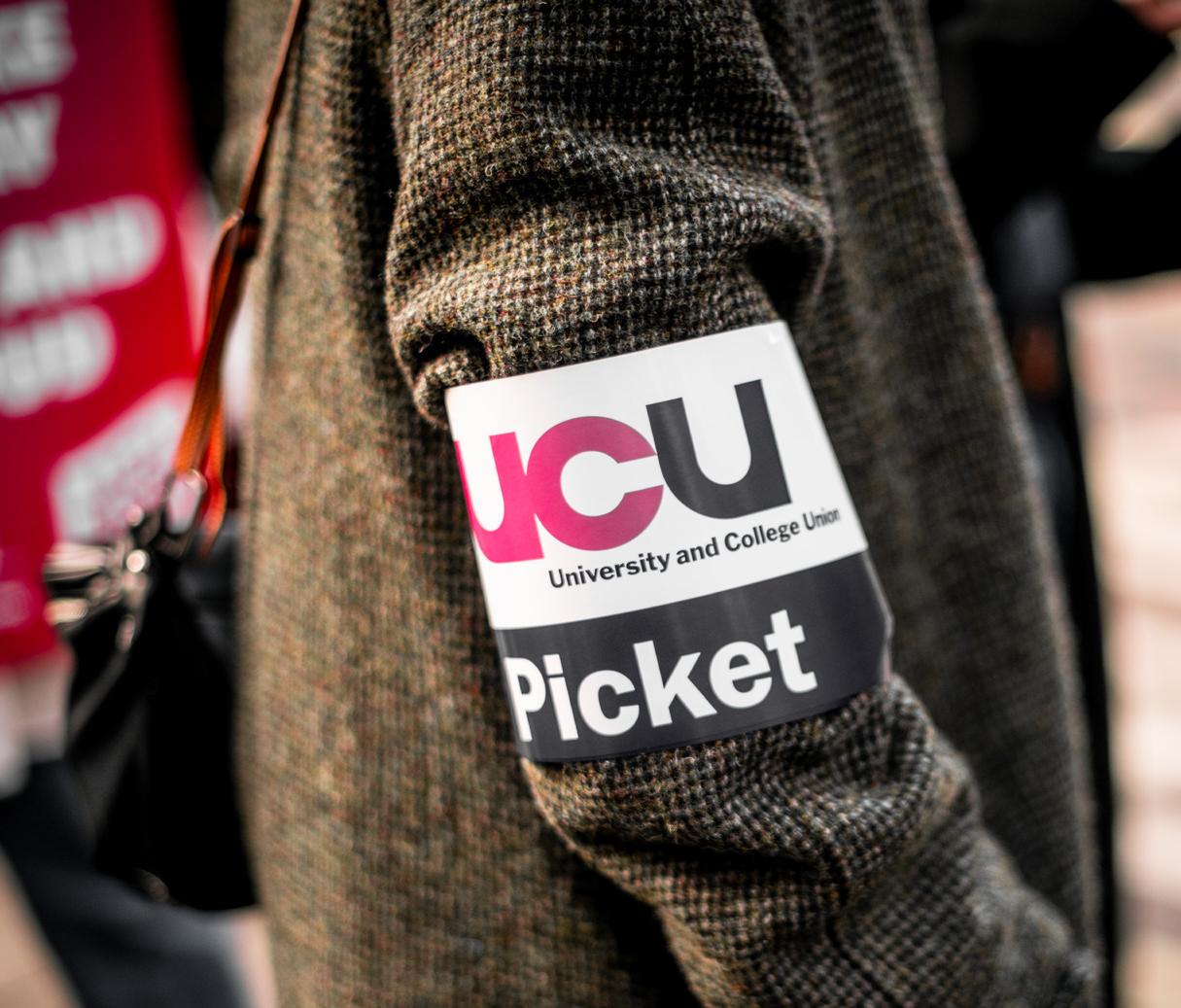
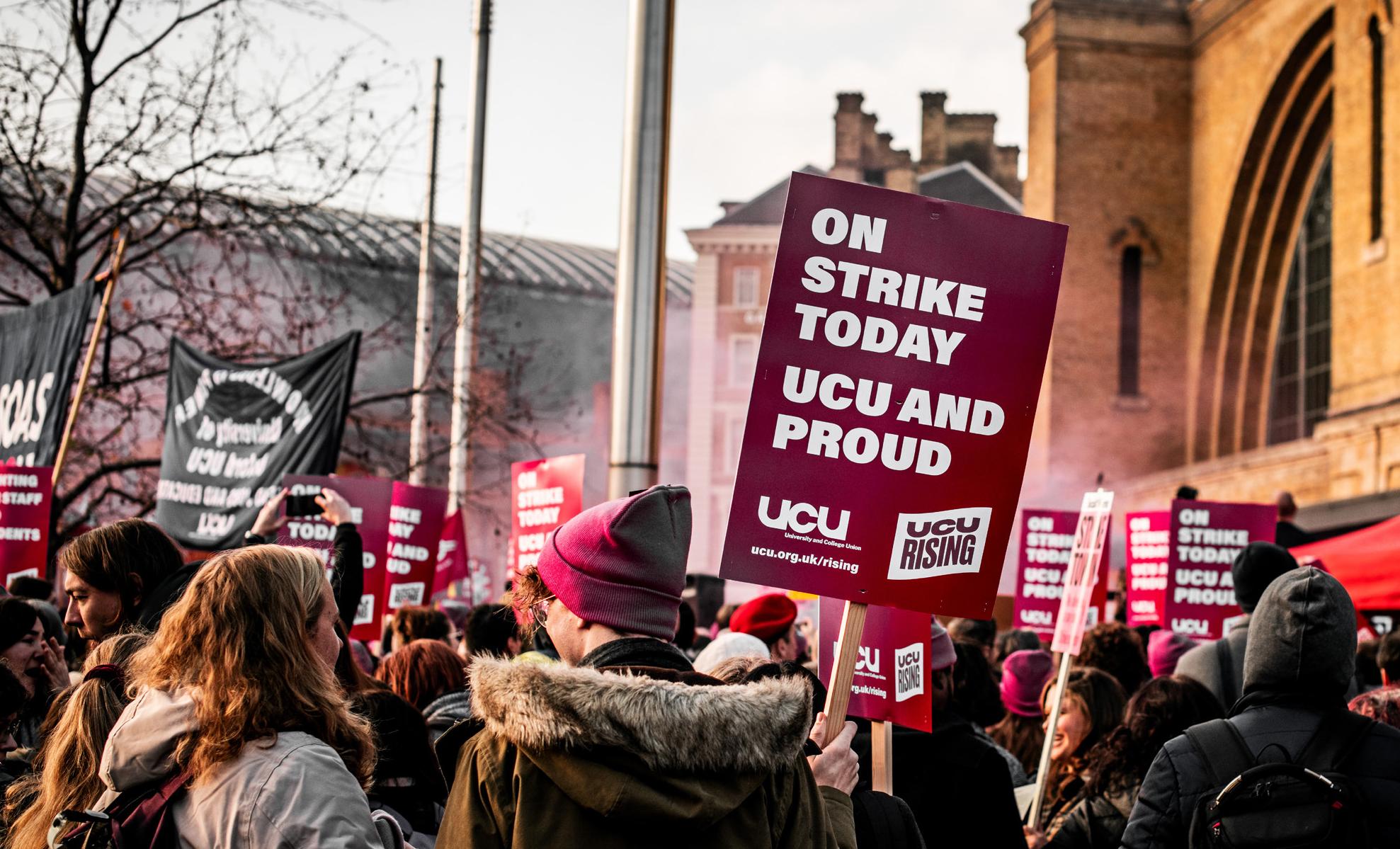
Cancelled classes, picket lines, topics left uncovered and unassessed; strike action has continuously permeated student life in the UK. For the fourth year in a row, members of the University and College Union (UCU) are taking action against the current state of pay, working conditions, and pension cutss. Around 70,000 university staf at 150 universities across the UK are striking over the course of three days, which could impact as many as 2.5 million students. As part of our strike coverage, The Beaver interviewed LSE staf at the picket lines and teach-outs across campus throughout the week and also conducted an exclusive interview with the UCU President Janet Farrar.
e Beaver reports: at the picket line
 Anya Saund
Anya Saund
Professor David Lewis and Associate Professor Tim Hildebrandt, who were picketing in front of the NAB, echoed the UCU’s demands, especially in terms of pay and equality. The UCU is demanding a minimum pay increase of £3349 for all members.According to Professor Hildebrandt, in real terms, LSE staff are currently dealing with a loss in income, due to high inflation.
Professor Lewis drew particular attention to the pension issue, noting that ‘‘a pension is not just a gift you receive at the end of your working life. Rather, it is something you work towards for years.’’
Both emphasised that they were striking to ensure that others can enter into the profession under “fair and non-exploitative conditions.’’ Steven*, an Assistant Professor, noted that at the current rate, he will not be able to afford to retire.
Shakuntala Banaji, Professor of Media, Culture and Social Change, told The Beaver that the Universities Superannuation Scheme (the pensions
scheme used by higher education staff) “predicted that there was going to be a shortfall in the pension pot, based on mistaken figures”. This is why employers have imposed cuts. However, according to Professor Banaji, “they have had a £5 billion profit and they are still saying they are going to cut pensions.”
In addition to pension cuts, junior staff members are also disproportionately affected by casualisation.
Dr. Dave Ashby and Lawrence*, an LSE100 fellow and an LSE100 Professor, respectively, lamented the casualisation of higher education. Lawrence said that management are “chopping up roles”: “When a permanent member of a teaching staff retires, the role is divided into three part-time temporary positions.” This “uberification” of universities preys upon vocational educators, for the sake of profit.
LSE 100 fellows, Mark* and Dr. Nina Vindum Rasmussen were among those striking outside the library. Mark told The Beaver that the impact of increased workloads is what affects him most - describing his current responsibilities as ‘‘exhausting.’’
Dr. Ashby spoke about how he offers unpaid additional office hours around assessment time because he wants to “provide as much help as he can.”
According to Dr. Vindum Rasmussen, the workload and precarious working conditions mean that, despite her love for academia, it ‘‘just doesn’t feel sustainable in some ways […] Even if it’s very specific issues we’re fighting [for] on the picket line today, it feels like it is a much, much bigger fight.’’
Dr. Lukas Slothuus, a visiting fellow at the Department of Government, was also picketing in front of the Centre Building on Wednesday. Dr. Slothuus made suggestions as to what LSE management could do. He said that, whilst payment and pensions agreements are decided by national negotiators, ‘‘LSE can put pressure on the national bodies to make those changes.” He suggested that the LSE management could ‘‘abolish those short-term and fixed-term contracts […] they have the power to do that. They could just say ‘we will not hire anyone on less than a three year contract’ or ‘we will phase out insecure contracts’’’.
Dr. Slothuus recognised the inconvenience and the disruption that the strike caused for students. He commented, ‘‘If there was some other strategy that didn't affect students that we could take,
we would totally take it. But I think it's really important for students to recognise that the ones who have the power to resolve this dispute are not staff […] The management could resolve this right away. They could […] just acknowledge that actually they don't need to cut the pensions. They could give us a pay rise and then they could end this disruption.”
The Beaver asked strikers for their views on the possibility for change. Lawrence suggested that it may be possible for “things to deteriorate even further and to reach critical bottom for change to happen but … something has to give”. Professor Banaji said that LSE UCU negotiated with LSE’s management so that when “they cut [our] pay for strike days this goes into a student hardship fund, which not all institutions agreed to do ''.
Professor Banaji also said that “students and teachers together are much stronger.” This sentiment was echoed by Lawrence* who said that “upping student and staff solidarity” would be of huge significance. Dr.Ashby also stressed that it's the “students and staff who make the university”; that we need to
jointly combat this “commodification of education” as he doesn’t want to “go into the classroom to sell a product.”
A way to effect change is to demand transparency on how our fees are distributed from management. Staff spoken to by The Beaver said that we have their full support in requesting fee refunds because of a “loss of experience”, as they are also striking to improve our quality of education. It is the unity between students and teachers which the UCU believes will have a powerful effect on leadership.
The Beaver found that striking staff in general are pleased with the level of support shown so far by the student body as it is only with this solidarity that the LSE will listen to them. The UCU has said that disruption can be avoided if employers act fast and make improved offers. If they don't, strike action will escalate in the New Year alongside a marking and assessment boycott.
*Names in this article were changed to preserve anonymity.
Niina Leppilahti
Contributors
16
Photographed by Rayyan Furreedun
“We are trying to save higher education”: UCU President on strikes and 2023 escalation strategy
Amadea Hofmann Contributor
Photographed by Rayyan Furreedun
While strike action has dominated public discourse, the focus has largely remained on rallies and teach-outs. Few are aware of how action may escalate in the new year, potentially resulting in a marking and assessment boycott. The Beaver spoke to UCU President Janet Farrar for an inside look into what is at stake, the failings of LSE leadership, and the 2023 escalation strategy if current negotiations are unsuccessful.
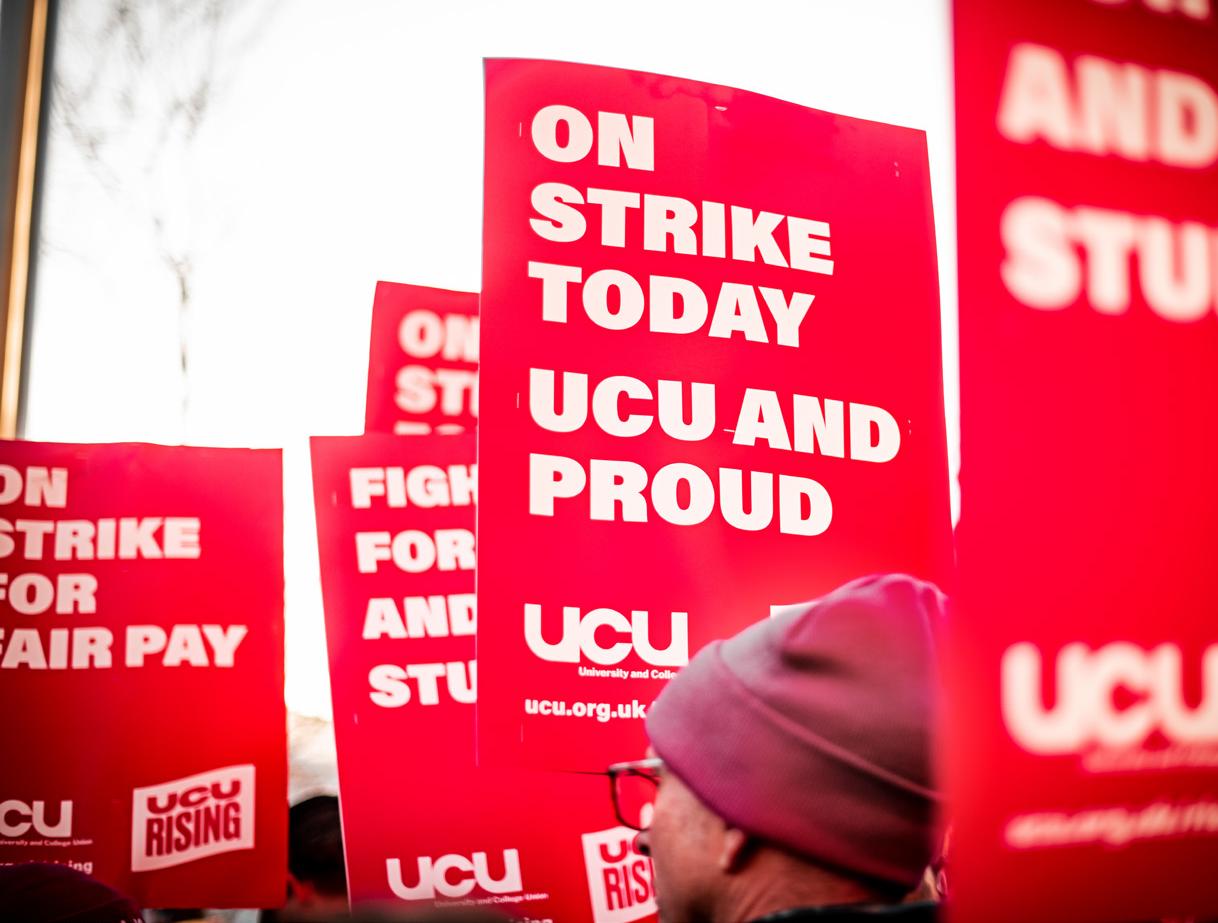
“Nobody wants to take strike action,” Farrar said. “It is the hardest thing, especially when you care about students as much as we do as members … we are doing it as an absolute last resort.”
For Farrar, this dispute is about something more than pay rises; she views the conflict as almost existential. “The amount of insecurity, the huge workloads, and the cuts to the pensions are still pointing to a very broken sector,” she said.
“And that’s why we say – without any kind of apology in this dispute – we are trying to save higher education.”
Farrar argued that while “education is a hugely transformative force,” it has been “turned into a marketised profit-making machine.” The stark realities of the financial strain on staff are difficult to reconcile with the fact that the UK private university sector has seen a £3.4 billion surplus in 2020/21. Ultimately, “this is about priorities, not a lack of money.”
Notably, LSE announced the construction of a new building at 35 Lincoln’s Inn Fields in July 2022 –six months after opening the Marshall Building. At a student Q&A hosted by the LSE Directorate, LSE Director Minouche Shafik remarked that due to the ongoing construction costs, “we have to make profits because we have to pay for all those buildings.”
Farrar criticised universities “engaging in vanity projects,” such as “shiny buildings,” arguing that “if you ask your average student, what they would prefer to have: a
committed lecturer (…) or a shiny building, I’m pretty sure I know what students would prefer.”
At LSE, the student body voted in favour of the LSE Student Union lobbying LSE to accept UCU demands.
The perceived mismatch of priorities has caused LSE leadership – and particularly Shafik – to face strong criticism. Farrar said that university directors are “on the most ridiculous salaries that you’ve ever heard,” quoting Shafik’s £507,000 pay in 2019-2020, while there are staff members “who are highly casualised, who are using food banks, who are burning out with stress, who are experiencing race, disability, and gender pay gaps for work of equal value.”
UCU members view Shafik, along with the wider LSE leadership, as having leverage on the national stage that they are refusing to utilise. Farrar claimed that “Vice-Chancellors are really powerful people and if they – even on an individual level – were to say to the UCEA [Universities and Colleges Employers Association] or UUK [Universities United Kingdom],: ‘Tthis is not right and I won’t stand for it,’ they would have to be taken seriously. There are only 150 Vice-Chancellors in the national bargaining unit.”
This sentiment was reiterated by the Chair of LSE UCU Committee, Joanne Taplin-Green: “Where [is LSE] ranked right now? Three or four or something in the country [the Complete University Guide 2023 ranked LSE #3 in the UK] … [LSE is] very prominent and [Shafik] is one of the highest-paid directors as well.”
“She absolutely has a responsibility for advocating for her staff.”
At the student Q&A, The Beaver confronted the LSE Directorate, including Shafik, with concerns of their allegedly limited involvement. The Directorate disputed the claim that LSE has not lobbied with the UCEA and UUK, saying that they “absolutely do feedback to our national negotiating body,” but cannot always make these submissions public.
Shafik also said that “one of the challenges for us with this strike is that it is not a local issue, it is a national issue … so the LSE is, I’m
afraid to say, a very small part of these discussions.”
Due to the national nature of the dispute, the Directorate claimed that “a variety of institutions all negotiating within the pay framework” with different financial constraints, makes it difficult to reach a compromise.
In response to the £3.4 billion surplus in the UK private university sector, the Directorate argued that LSE is “not a for-profit organisation. We don’t have shareholders or anything like this. Any money that comes into the institution stays within the institution, and essentially gets re-invested either for staff, or for facilities, or for scholarships, or new buildings, and so on.”
Pointing to the difficulties of negotiating on a national level, the Directorate said that “if we moved to a system whereby institutions had a bit more flexibility … going forward … that might help a lot, because then those institutions that can afford to reward staff in different ways would have more autonomy.” But currently, they are resorting to “participating actively in those negotiations and making our point of view known.”
The past lack of successful negotiations is what spurred the UCU to engage in a historic aggregated ballot this year. Farrar explained that the strategy the UCU embarked on was “a completely different approach, balloting everybody and trying to get 50 percent% overall.”
“It was quite a risky strategy in a lot of ways,” Farrar said, admitting that she was faced with “a lot of nay-sayers.” But ultimately, “the “level of anger in the sector mobilised people who might have been quite passive trade union members before.”
Farrar believes that this year’s strikes are different from the ones preceding them, “in the sense that this is 150 universities being brought to a standstill. At the same time, the UCEA have actually asked the Vice-Chancellors for a mandate to renegotiate with us, which they didn’t do last time. So that
indicates to me that they are serious about reopening negotiations and ultimately, our door is open. We want to have those negotiations. We want them to be meaningful.”
In terms of what would constitute meaningful and successful negotiations, Farrar said that while there is a degree of flexibility, the UCU’s baseline is “an increase to all spine points on the national pay scale of at least inflation, so of at least RPI [Retail Price Index] plus 2 percent%, or 12 percent%, whichever is higher.”
If strike action does not result in successful negotiations, Farrar disclosed that a marking and assessment boycott is “certainly something that is part of the escalation strategy for the new year.”
The UCU mandate covers both “strike action” and “action short of strike.” It expires in April 2023, meaning that while UCU members would need to be re-balloted for the boycott to affect end-of-year exams, the mandate could affect January exams and summatives for Michaelmas Term.
Farrar’s rationale behind the boycott is that “industrial action is about the biggest impact and biggest disruption.” Students receiving delayed feedback on assessments would lead to widespread outrage and calls for universities to take action.
“In a marketised model, ‘students as customers’ culture is very strong,” Farrar said. “Employers are much more interested in listening to students
than they are to staff, rightly or wrongly.”
However, the potential boycott would impede on the promised academic experience for students, which could ultimately threaten their support for the UCU. Student solidarity remains vital in the decisive moments of the dispute. As such, Farrar implored students to remember that the dispute is about “the greater good … and benefiting everyone.”
In order to prevent action from escalating, student action is key in galvanising universities to meet UCU demands. “The best thing students could do right now would be to directly contact whoever their leadership is,” Farrar said. “So that could be via social media … or it could be in a more formalised way, where they write a letter to the Vice-Chancellor to say, ‘this is completely unacceptable and here’s why, here’s our perspective.’”
“Any student voice is powerful.”
Ultimately, the UCU strikes are about “changing the system because higher education is broken for staff and for students. That is literally the crux.”
While UCU strikes have historically resulted in little administrative change, Farrar sees light at the end of the tunnel: “I’m incredibly optimistic about 2023. I do believe that the employers are going to be forced to listen to us this time because we’re too big to ignore, really.”
17 BEAVER EXCLUSIVE - UCU Strike Coverage
REVIEW
 EDITED BY BEN HELME AND SYED ZAID
EDITED BY BEN HELME AND SYED ZAID
ALI

Rachel Ponting's All-Time Best: Normal People by Sally Rooney
For my all-time best, I have chosen Sally Rooney’s 2018 novel, Normal People Capable of both bringing me to tears and making me rip my hair out in frustration, this novel has stuck with me in innumerable ways since I rst read e book follows the lives of Connell and Marianne, two students who navigate growing up, toxic relationships, and their feelings for each other. Rooney constructs painfully realistic moments between the two characters, whose relationship is threatened by miscommunications and insecurities. Despite this, the pair always nd their way back to each other as if magnetically attracted.
I found this novel heartbreaking, and I was le feeling numb for several days a er reading it. Rooney creates a beautifully raw story as she contrasts intimate emotions with blunt realities. Her sensitive depiction of the main characters’ coming-of-age experiences resonated with me and I’m sure struck a chord with many other
So, if you’re in the mood to have a good cry and have your brain chemistry
Firstly, the set and costume design really make you feel like you are back in the 1990s. e Crown has always managed to capture the mood of whichever decade it's in, but I think this is even more impressive since it can be easy to mess up more recent period pieces. Secondly, this season, just like the others, is bedazzled with star actors who give pleasing performances all around. I was particularly impressed by Lesley Manville as Princess Margaret and Dominic West as Prince Charles.
However, this season doesn’t have the same standout performances that previous ones did. While seasons 1 to 4 were lit up by the likes of Olivia Colman and Matt Smith, this season lacked such performances. is is partly because the characterisation within this season is just not as good; characters feel more like a caricature of themselves.
e Crown - Season 5
by JEREMY RICKETTS-HAGAN
Season 5 of e Crown premiered in a year of immense change for the Royal Family, and covers similarly turbulent times for them. Despite having some successes, the series falls short of expectations.

Finally, one key attraction of e Crown was that it gave life to relatively distant events in the national past that were lesser known or had been lost to time. ere is simply no way to do that for this season. It would be extremely di cult to nd a viewer of the show who did not know that (spoiler alert) Diana and Charles end up divorcing, as this has already been dissected by countless documentaries, TV shows and lms. So, there is little insight that this season can o er, and the writers fail to nd a solution to this.
us, e Crown manages to excite in its usual way, but fails to provide the insight that de ned its earlier seasons.
REVIEW Team's Top Songs of 2022
Members of the Review team and editorial board have each selected what they view as the best song of the year. Listen to the results below!

 Image from e New York Times
Illustration by FRANCESCA CORNO
Image from e New York Times
Illustration by FRANCESCA CORNO
Scan this code through the Spotify app camera function, or search for 'The Beaver's Top Songs of 2022'.
Falling for Christmas by
VANESSA HUANG
If you have yet to see Falling for Christmas, now is the point where you put this down and stream it on Net ix. A er years of dealing with personal struggles, it’s nally Lindsay Lohan’s comeback (a Lohanaissance, if you will). e lm itself is awful, but it’s so bad that I have looped all the way around to absolutely loving it. I am therefore awarding it the ve stars it deserves for an experience so entertaining it cannot be topped.
e lm has all the trappings of a generic Hallmark Christmas romcom: a sophisticated city girl goes to a small town for the holidays and learns to appreciate the simple joys of country life, all while falling in love with a rugged, down-to-earth local.


Lohan plays hotel heiress Sierra Belmont, while love interest Jake (Chord Overstreet) is the owner of the local B&B. To really amp up the soppiness, he’s also a widower with a young daughter. So far, so good.
But Falling for Christmas stands head and shoulders above many of its peers. Unlike the standard fare, it doesn’t even attempt to be good. e screenplay seems to have been conjured up in about an hour, rife with plot holes and clunky dialogue. e lm also looks woefully tacky, from the poorly made props to the distractingly bad green screen – and that’s precisely what makes it so brilliant.
e lm opens with Sierra holidaying at her father’s ski resort with her in uencer boyfriend Tad (George Young). e pair are spoiled and bratty – the perfect image of people in need of some small-town family values. e whole thing is set in motion by a mountaintop proposal gone wrong in the campiest way. A er Sierra says yes, she loses her footing; Tad tries to grab onto her hand but the too-big ring simply slips o . As indicated by the title’s excellent wordplay, they’re sent toppling down the mountain, in a fall cinematic enough to rival Decision to Leave
e head trauma from the fall leaves her in a fugue state, unable to recall anything including her own name – she now goes by Sarah. Jake nds her and o ers to take her in, while Tad, memory una ected, is conveniently shepherded into a separate storyline. (In reality, a woman su ering from amnesia being taken in by a random man would be absolutely terrifying. But it’s Christmas, so we just let that go.)
And thus begins her domestication. She spends her days learning to cook and clean – cue the montages of Sarah ooding the laundry room and struggling to crack an egg. rough all this, we’re somehow supposed to like Jake, a man who is perfectly happy to dump a load of chores on a woman with a newly incurred head injury. She has overly sentimental conversations with Jake’s daughter about their mothers dying. She also joins in with the local festivities, in a town simultaneously so small that everyone seems to know each other and so big that
not a single person recognises the uber-rich resort owner’s daughter.
Lindsay Lohan brings a refreshing sincerity to FallingforChristmas, committing to the lm and all its silliness in a performance reminiscent of her star-making turns in Freaky Friday and Mean Girls. Yet for all the charisma that Lohan has, she and Overstreet as a couple are utterly charmless; so charmless that I want to say they have negative chemistry – helped in no part by the obvious body double standing in for Lohan when they kiss. But this only adds to the hilarity.
Falling for Christmas is the gi that keeps on giving. Where else will you nd
Lindsay Lohan singing "Jingle Bell Rock", a creepier-than-usual Father Christmas, and apt commentary on Airbnb’s disruption in local communities, all wrapped up in some of the most atrocious editing ever committed to lm? It’s somehow the best and worst lm I’ve seen this year. I haven’t laughed this hard in a long time.
by Arctic Monkeys
by SOFIA LAMMALI
e Arctic Monkeys’ seventh studio album e Car marks the She eld band’s transition from an indie rock band to a smooth lounge act. It comprises songs that you would be more likely to hear in a cocktail bar than at a rock concert. Fan reception to this change has been incredibly polarised, but the album is nonetheless a decent step into new territory.
e rst single of the album, which is also the opening track, “ ere’d Better Be A Mirrorball” hinted at this drastic change upon its rst release. Opening with a dreamy piano, we are then serenaded by Alex Turner’s distinct vocals over a melancholy drum beat. It’s a solid, sultry opening number. “Body Paint” acted as the album’s second single, and is perhaps the closest to their conventional style, being lled with the swagger that has come to de ne the band. It has endearing synth leads and violins that keep things interesting in addition to the entertaining guitar solo at the end.
Despite decent singles, the album has its fair share of llers. e title track, “ e Car”, is unfortunately quite forgettable. ough the balance between the string orchestra and guitar is interesting and just about works, it doesn’t lead to a particularly compelling song. “Hello You” is more playful, but zzles out abruptly, as does “Mr Schwartz”. is tendency for songs to end suddenly with little warning is prevalent throughout the record.

e album’s highlight is the second song “I Ain’t Quite Where I ink I Am”. Its funk bass li s the mood and is complemented by an orchestral bridge and cinematic violins. e obnoxiously titled “Jet Skis On e Moat” is also strong, opening with a smooth, 70s funk guitar and manages to balance gloomy with sexy. “Big Ideas” is also a high point. It is the most climactic song on the album, worthy of a James Bond soundtrack, with a full-bodied orchestra.
“Sculptures of Anything Goes” sees the band use drum machines and synthesisers to create a booming bass beat, more reminiscent of their previous work. It’s a little unsettling, and one that will prove a little divisive. Finally, “Perfect Sense” closes out the album with wonderful violins, but it doesn’t have the feel of a closing track and is ultimately rather underwhelming.
As a whole, however, the album works. e retro arrangements are impressive and the album successfully creates atmosphere. Its main drawbacks are that a lot of the songs are remarkably unmemorable. It’s not exactly thrilling, and some will de nitely get frustrated by how there is rarely a chorus nor climax that makes the occasionally tedious pacing worth it. e lyrics are enigmatic at best and nonsensical at worst, and Alex Turner’s vocal performance is far from his best. Despite this, the album triumphs through lavish instrumentalization, a cinematic feel and a bit of glam rock air.
Image from Net ix
LSESU Drama Society Productions And

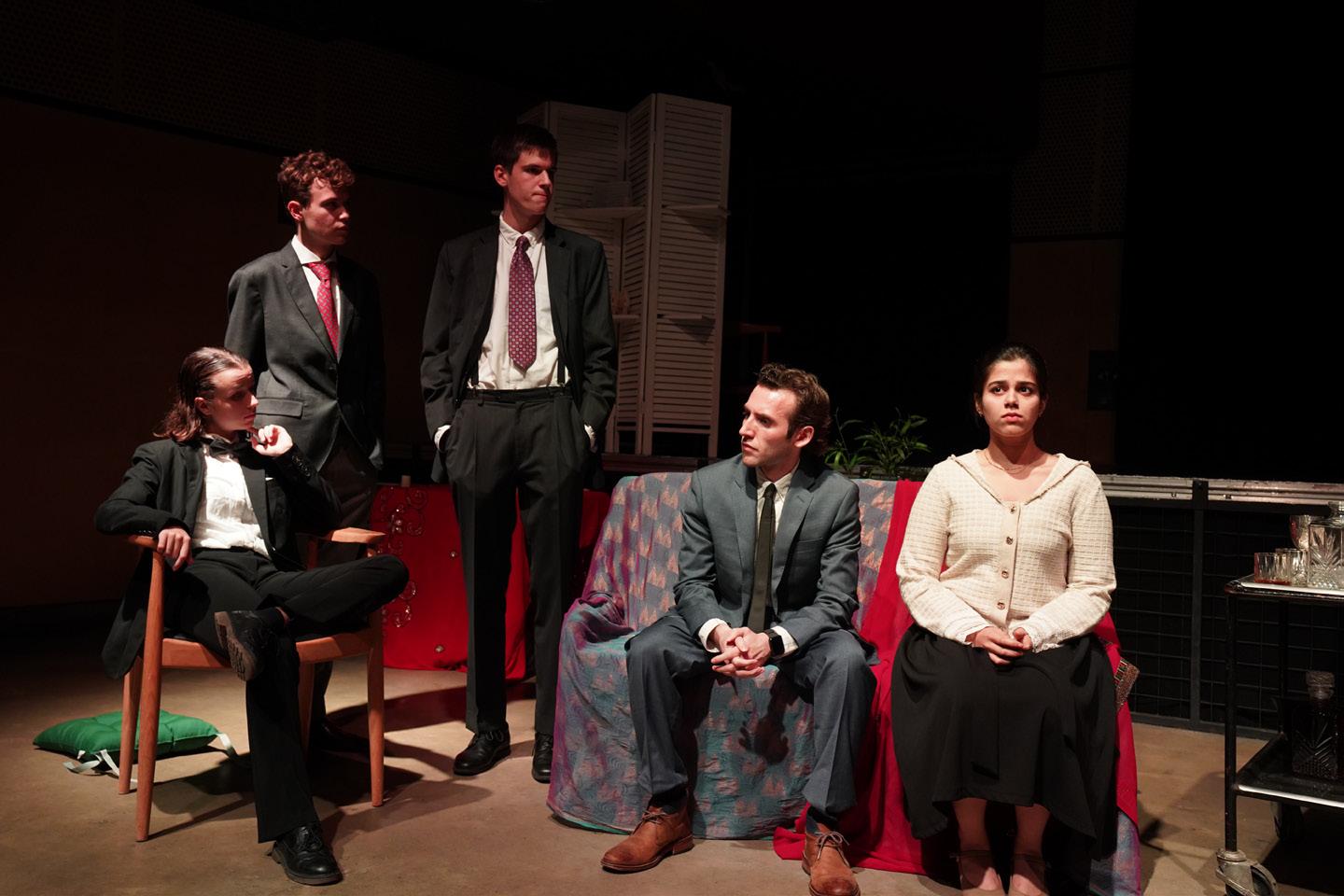

en ere Were None
by JILL SHAUGHNESSY
In case you missed it, LSESU Drama Society put on a successful production of the Agatha Christie classic And en ere Were None in early November. e production ran for three nights and was staged at e Venue in the Student Union building. e small stage made for an intimate performance that added to the eerie atmosphere. e audience was met with an exciting period drama with all the style of a classic whodunit.
Despite simple staging and sets, the cast impressed with enthralling monologues and intense emotions. Martina Sardelli, who played leading lady Vera Claythorne, gripped the audience with her realistic sorrow. Additionally, I thought Lara Arencibia Pender’s portrayal of William Blore to be convincing as well as comedic, and that Konstantin Burgess gave a wonderfully terrifying performance as Sir Lawrence Wargrave that simply stole the show. e play was well cast as every actor seemed to t their respective character perfectly. Also, the direction was impactful and seemed meticulous.
I was worried that the play would lose momentum in the second act. However, I was proved wrong. e production allowed you to become entranced in the gripping mystery until the killer was nally revealed. In short, although some moments included awkward silences or stumbling over other actors’ dialogue, I thought the play was incredibly impressive (especially as a student production with short rehearsal periods and small budgets). I can’t wait to see what Drama Soc produces next.
ree Sisters
by SYED ZAID ALI
Staging classic works such as Anton Chekhov’s ree Sisters is no easy task. Standing on the shoulders of over a century of productions, a director today will be hard-pressed to tell the story in a way that is not only unique, but also develops our understanding of the play. Facing this challenge, the most recent LSESU Drama Society production sees director Hila Davies placing our characters in the here and now.
A sense of claustrophobia is fostered on the small stage of the Old eatre in the Old Building, which is lled with closely-arranged sofas and chairs. row blankets are strewn haphazardly across them, selling the fact that the play opens in a at share that is “painfully reminiscent of student-living”, as Davies puts it. e present day setting is further cemented through a variety of methods: prop newspapers with headlines detailing Russia’s invasion of Ukraine, mentions of lockdown, characters scrolling through Twitter, and so on.
Despite its radically di erent setting to the original, this production retains most of the plot and characters as written by Chekhov. As such, the direction they took with this play makes sense, thematically speaking – in a time of such great uncertainty, the despair experienced by some of the characters o en struck a chord within me. However, some features of the play do not translate as well to this modern setting – for instance, the duel between Solyony (Victor Destang) and Tuzenbach (Ollie Scrivens) seems a little dated when contrasted against discussions of the Metaverse.
e entire cast deserves praise for their e orts in putting on this production. e sisters, of course, play their roles well. e weariness with which Harriet Shaw plays Olga clearly underscores her character’s responsibilities as the eldest. Soryoung Han’s depiction of Masha’s melancholy was measured, and her interactions with the equally as impressive Fabian Jones kept me engaged throughout. Jones’ portrayal of the “lovesick Major” Vershinin was successful, as he convincingly depicts the older gentleman’s calm and collected demeanour all while assuredly presenting several philosophical monologues. ough, I believe Nadja Lovadinov’s turn as Irina was the most impressive; the scene in which her character breaks down, lamenting her work and the eeting nature of life, was a standout moment.
ree Sisters remains as one of Chekhov’s most complex works, with a multitude of character relationships to keep track of. is production could have bene ted from taking more time with establishing and elucidating these relationships, which I had trouble keeping track of throughout the rst half. is might have also been a result of pacing issues. Some scenes went by a tad too quickly, leaving little room for the words to sink in.
Regardless of these minor faults, this was yet another successful production by Drama Soc. e greatest boon of setting it in the present is that it reminds us of the timelessness of the great works of the stage. As we question the purpose of this life we are given, Chekhov reminds us to keep going. A er all, as the titular sisters tell us, “We must live, we must live…”
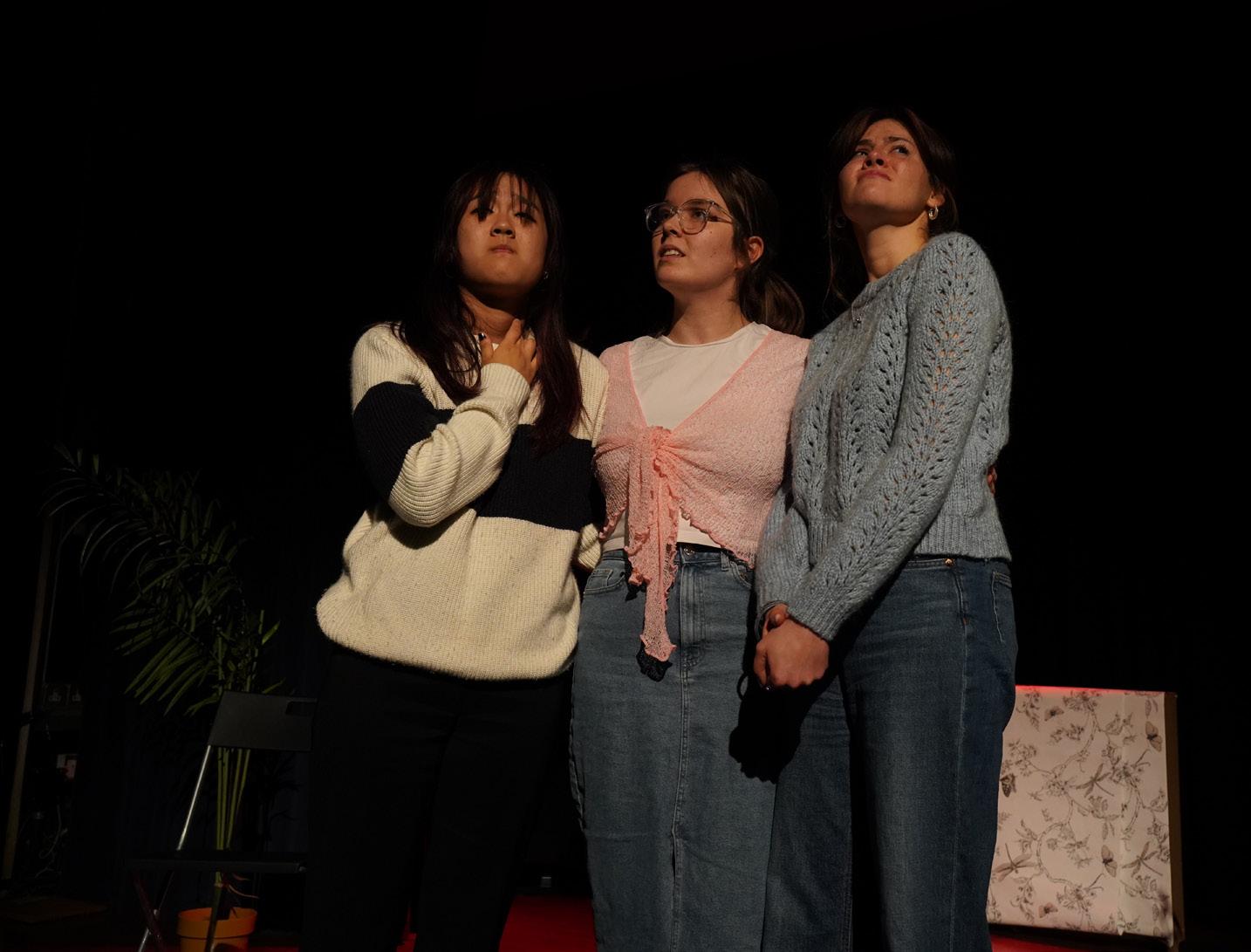 Images courtesy of Drama Society
Images courtesy of Drama Society
Battle of the Prequels
Illustrated by MITHALINA TAIB
e Lord of the Rings: e Rings of
by JEREMY
RICKETTS-HAGAN
House of the Dragon
by SULAKSHI RATNAYAKE
had been completely erased from the cultural zeitgeist, due nal season of George. R. R. Martin's fantasy epic. e e Dragon was tasked with a tall order: navigate a tainted legacy while regaining the trust of a cheated audience.
Its rst triumph is its ability to distinguish itself from its predecessor. e story focuses on the “Dance of the Dragons”, a con ict from long before Game of rones, as Princess Rhaenyra Targaryen battles for the Iron rone. Her greatest adversary is Lady Alicent Hightower, who provides a stark contrast to the free-spirited Rhaenyra. Hightower is trapped in a loveless marriage to the king and bound by duty to bear heirs. Her resentment of Rhaenyra, who explores her burgeoning sexuality while asserting her claim to the Iron rone, divides the court between the Blacks and the Greens. e fraught dynamics of the exceptionally inbred Targaryens take centre stage as unchecked ambition, festering resentment and misunderstanding give rise to war.

House of the Dragon sets itself apart with the limited use of graphic violence and nudity (although the show is by no means free of graphic depictions). e sex, rather than gratuitous, is intentional as it depicts a young women’s sexual exploration. In doing so the story chooses to depict female agency and pleasure, or in Alicent’s case, the lack thereof. Game of rones rarely achieved this.
of Power, unlike House of the Dragon, was not severely burdened with having to please a fanbase le unsatis ed with its recent product. However, it was clear that e Rings of Power was expected to capture its audience in a manner more like the renowned e Lord of the Rings trilogy than the less celebrated e Hobbit trilogy that followed it. On top of that, it also had the double-edged honour of being the most expensively made television show in history.
So, how does eRingsofPowermeasure up? For better or worse, the rst episode encapsulates all the best parts of the show’s rst season. e cinematography and grand set designs hark back to the absolute best aspects of the franchise. J. R. R. Tolkien’s fantasy world is again translated exquisitely onto screen with beautifully cra ed cities and scenery to inspire even the most lukewarm of fans. e premiere also does not disappoint in terms of its fantastic world building. Great attention to detail is evident in the intricate lore and intertwined societies that populate Middle Earth.
However, this is as good as it gets for the show. e next few episodes are riddled with a sense of stagnation. It feels as if each episode is essentially the same. Storylines that started o intriguing become uninteresting as the plots fail to progress. e aspect of the show that disappointed me the most is its scale. is franchise has always been expert at creating multiple storylines across a sprawling world, yet still presenting a coherent and intertwined narrative. is show fails on that end. On top of the storylines being largely uninspired, the characters involved are not very memorable or engaging, and the plots seem to be entirely separated. Some of the storylines become slightly more intertwined in the latter half of the season, but this is nowhere enough to save the season’s bad pacing and development.
Overall, eRingsofPower manages to capture the beauty but not the brilliance of e Lord of the Rings trilogy. A stagnant story and forgettable characters prohibit further success. is show will do little to satisfy the grand expectations of long-term fans of the franchise, and will do even less to attract new viewers.


e show does manage to capture some of the lost magic of those early seasons of Game of rones, largely through casting and performance. e acting duos portraying Rhaenyra (Milly Alcock and Emily Carey) and Alicent (Emma D’Arcy and Olivia Cooke) o er performances that blend seamlessly across a decade spanning narrative. Matt Smith gives a praiseworthy performance as the Rogue Prince Daemon. Smith exudes a rascalish charisma so potent that even the most rational fans nd themselves rooting for incest. Paddy Considine as King Viserys delivers a haunting portrayal of a frail king torn between his duty to the realm and love for his daughter. e spectacle and scale of the story never outshines the nuanced performances.
While there is plenty to admire in this medieval epic, the show fails to contain the breadth of the story in its ten episode run. e time jumps between episodes span decades. Jarring at best and at worst a disservice to Martin’s A Song of Ice and Fire e story and character development in the intervening time are le to the audience’s imagination. e disorientation worsens as actors are swapped out to account for the breakneck speed of the narrative. e supporting cast nevertheless deliver outstanding performances that leave the audience wanting more. e dialogue leaves something to be desired as the constant droning on about duty and succession fails to hold a candle to the wine-induced diatribes of Tyrion or Cersei.
e most commendable achievement of House of the Dragon is that it has successfully revived a dormant fandom. is scorned fan of Game of rones took a quick liking to it despite initial trepidations. House of the Dragon will tide us over nicely till George R. R. Martin publishes the next instalment of this epic fantasy.
SOCIAL
EDITED BY LIV KESSLER
What LSE Study Spot are you based on your star sign?
 By Hila Davies & Illustrated by CHARLIE TO
By Hila Davies & Illustrated by CHARLIE TO
Aquarius - e ree Tuns
You can frequently be found in Tuns for your study sessions, that is, if you even make it on to campus. Your contrarian attitude is at home in Tuns’ cosy sofas, 12-11 opening hours, and the ability to read Saïd slightly tipsy. With the bar practically empty in the a ernoons, you love how antisocial your study sessions are (whilst still giving the illusion that you are up for a good time). Cheers!
Pisces - Shaw Library Terrace
Ah, good old Pisces - romanticising your life once again. You can be found doing your readings on the Shaw Library Terrace, probably sipping a dirty chai, headphones blasting some sort of dramatic movie soundtrack that gets you just to the edge of tears. For you, studying only happens when you’re emotionally in the right headspace …Enjoy the views (and awful wind), babe!
Aries - Bottom Floor of the CBG
Always the social butter y, you can be found on the bottom oor of the CBG, itting from table to table for a chat… or maybe to make sure your friends are not getting distracted again. A natural born leader, you love how you can sit with your co ee, enjoy the busy atmosphere of the CBG, and keep tabs on everyone, all at the same time. Is the CBG absolute sensory overload? Yes - and you thrive in it.
Taurus - Lincoln’s Inn Fields
Ever the earth sign, Taurus’ can be found in Lincoln’s Inn Fields, basking in the outdoors every chance they get. e sign known for being the sleepiest, you enjoy a cheeky mid-a ernoon nap under the trees and being able to feel the ground beneath your back. Always the stubborn one, you will be out in that eld come rain or shine, no matter how many pairs of trousers you’ve had to dry clean, ruined with mud stains.
Gemini - Old Anthropology Library
My fellow anthropologists are going to hate me for this one, but honestly, I don’t think there’s anything more Gemini than the Old Anthropology Library. Sometimes dead silent, sometimes lled with raucous laughter, this space is perfect for you, restless Geminis. Always lled with new, interesting people, it ful ls your desire for a good conversation, without leaving you bored. You always get to be the ‘Yes, but…’ person and you love it.
Cancer - Pret A Manger
Sometimes campus can be a bit overwhelming, and there is no one it is more overwhelming for than my darling Cancers. You prefer the comfort of your local Pret, complete with a hot chocolate (with added whipped cream, obviously), for your daily study sessions. You enjoy the routine, but also nd great comfort in the strangers who pass through Pret’s hallowed halls each day. Everyone has a story, and you’re just grateful that you get to be a part of theirs.
Leo - 3rd Floor tables near spiral staircase
Oh Leo, oh babe… we know what you’re doing with this one. As much as you want to deny it, all Leo’s love being the centre of attention. Not in a 2000s mean
girl way (for the most part…), you just want people to appreciate your out t! You don’t spend hours curating your Pinterest board for nothing! Your view of the spiral staircase makes this the perfect ‘watch-and-be-watched’ spot for all your mid-study sesh cravings. And as an LSE Leo once told me, ‘the higher the oor, the cooler the people’. Everyone loves a little drama. XOXO and that…
Virgo - Silent Zone
As a Virgo, your study sessions are meticulously planned out. You enjoy the structured order of the Silent Zone, the no-food rule brings you much joy - you cannot stand the pesky rule breakers on lower ground - crumbs have no place near your freshly cleaned Macbook keyboard! When you enter a space, you like to use it for its intended purpose, and then leave it just how you found it. Voila - perfection!
Libra - 4th Floor Women’s Library
Always the cool kid, you can commonly be found fraternising with postgrads and PhD students in the 4th Floor Women’s Library. Obsessed with balance and equality, you nd harmony by being on the top oor, the symmetry of the rounded sofas and neutral colour scheme. is study spot reminds you of why you came to LSE - to have a meaningful impact in the
Scorpio - Velvet Sofa in 32L
Your study spot of choice is basically the closest you can get to dark academia within LSE’s newness. Suitably dungeon-like, the velvet sofas of 32L let you live out your vampire dreams, whilst also just being a great quiet place to get some work done. You like how there’s easy access straight into Lincoln’s Inn Fields for your midreading cigarette breaks, and are perfectly content with the lack of actual tables
Capricorn - Marshall Building
Capricorns, Capricorns, Capricorns… you’ve been waiting for this one, haven’t you? e perfect, no-nonsense place to live out your corporate fantasies - who could want more? You love how the Marshall Building makes you feel that your work is oh-so important, and nd much joy in the aesthetic of a brown paper bag apjack from the ‘Beaver’s Brew’. You’re there at 9, leave at 5, and cannot wait to be in the next morning. is is your world, LSE’s just living in it…
e Best and Worst of Festive Co ees

 By RACHEL PONTING & illustrated by IGA JASINKA
By RACHEL PONTING & illustrated by IGA JASINKA
With the festive season around the corner, co ee shop chains have launched their much-anticipated Christmas drinks menus. ese holiday drink items have a cult following, with many consumers eagerly awaiting their arrival each year, myself included. So, I thought I would take it upon myself to rank this year’s new festive editions from Costa, Starbucks, Ca è Nero, Pret, and Blank Street Co ee. Note, I am only reviewing the new co ees, not the hot chocolates (sorry chocolate lovers). If you are a black co ee drinker who would never dream of debasing your co ee by adding syrup, it’s safe to say this article is not for you. For everyone else, here is my ranking from worst to best of this year’s new releases.
6. Worst: Starbucks’ To ee Nut Cream Cold Brew Price: £4.45
is drink was a sweeter take on Starbucks’ classic cold brew with the addition of to ee nut cream and sprinkles. I personally liked this drink but it didn’t necessarily scream Christmas to me. Perhaps this was to be expected seeing as it was a cold drink but I still wasn’t overly impressed.
5. Sweetest: Ca è Nero’s Cinnamon Swirl Latte Price: £4.35
Whilst I absolutely love the design of Ca e Nero’s cups this year I found the drink itself to be disappointing. I couldn’t really taste the cinnamon and it was overwhelmingly sweet.
4. Cheapest: Pret’s Praline Latte Price: £3.55
e slightly more reasonable price earned it some brownie points but I found the avour to be a little strange. at said, I liked how it wasn’t overly sweet (like some of the other drinks) and I think the design of Pret’s Christmas cups this year is quite cute.
3. Most nostalgic: Blank Street Co ee’s Chocolate Orange Mocha
Price: £4.90
Growing up, Terry’s Chocolate Oranges were a Christmas staple in my household, so I was very excited to try this drink. It tasted absolutely divine. However, it was the most expensive drink that I reviewed and it wasn’t served in a festive cup.
2. Most festive: Costa’s Toblerone Latte

Price: £4.35
Although I found it slightly too sweet, I did like how creamy this latte was. However, the selling point of this drink for me was the mini Toblerone that came with it. is little extra was exactly the kind of festive cheer that I needed to keep me going through my otherwise depressing workload, and so boosted the ranking of this drink.
1. Best: Ca è Nero’s Luxury Black Forest Mocha
Price: £4.35
I really enjoyed this drink and I found that the sharpness of the cherry avouring perfectly balanced out the sweetness of the chocolate. is together with the fact that I love the design of this year’s Ca è Nero cup means that this drink occupies the No.1 spot in my ranking of new festive drinks.
Gimme that banana bread, and make it vegan!
By LIZA CHERNOBAY & illustrated by ANOUSHKA GULI
My initiation to the brutal realities of university life occurred through a repeated experience of mid-morning hunger. Yes, you know it – the desperate craving for sustenance you feel a er trying to switch on your brain at 9 AM.
When 11 o’clock seems a bit early for lunch, and another cappuccino wouldn’t be a su cient hunger cure, a thick slice of banana bread comes to mind. It’s lling enough, perfectly sweet and sort of nutritious!

My search for the most sumptuous banana bread within 20 minutes from campus began on one of those sleep-deprived, hangry mornings. Finding a good vegan option was challenging, but the sacri ce was worth it - a er all, we all deserve a little ‘dolce vita’ in our humble student lives, no matter the diet!
e next step was actually sampling banana bread - which was a risky business, as my ‘banana bread detours’ nearly made me late to class - but it was by far my favourite part! Some of my friends were lucky to get free banana bread tasting sessions along the way to help me rate my ndings. Ultimately, there was too much cake to nish by myself.
A er unleashing my inner Sherlock of the foodie world, inhaling banana
aromas and intently listening to my taste buds, my verdict is as follows:
Closest to campus: e Roasting Plant
5-6 mins
190 Strand, Temple, London WC2R 3LL
Not too sweet with a so banana topping, but a little too dry and cold for e slices are quite small too. A reasonable pick-me-up if you don’t have much time.
Biggest slice: Prufrock co ee
14 min
23-25 Leather Ln, London EC1N 7TE
A bit expensive for cake, but their slices are gigantic, so why not share it with your bestie? e cake is on a sweeter side, its texture pleasantly spongy - a perfect complement to co ee. e café itself has a busy, vibrant atmosphere - a great place to work if you like the buzz! Located in the heart of Leather Lane, it is a stunning excuse to explore the daily food market and get your lunch sorted!
Best texture: WatchHouse
Price: £3.75 (to go) / £4 (in)
Distance: 6-7 min
Location: Somerset House East Wing, London WC2R 1LA
is cake is the so est and smoothest, very aromatic and ful lling in avour. It is quite sweet, but not overwhelming. If you feel sophisticated, I recommend ordering toasted banana bread with *vegan espresso butter* and pairing it with an oat at white. What a dream - to sit with a cup of co ee, allowing the butter to melt into the cake, and observe the peaceful courtyard of Somerset House through the window!
Best overall: Store St Espresso
Price: £3.50
Distance: 20 min
Location: 40 Store St, London WC1E 7DB
Despite a slightly longer walk, this is the best banana bread I’ve tried in London! With a balanced sweetness and su cient moisture, the walnuts on top add a desirable crunch. Pairs well with a co ee and a dollop of coconut yoghurt. ey o er very generous slices too, which is a blessing considering how delicious it is! Make sure to ask for it toasted - and you’ll thank me later!
PART B
EDITED BY ANOUK PARDON AND SANA AGARWAL
Identity and subversion: an exploration of London’s raves
by CLARABELLE COKER-WHYTE & photographs by FELIX FRASER
We stand with our IDs out, hugging ourselves tightly as the September chill sets in, a reminder that summer is slowly receding into a distant past. e latex clothing worn by many outside the Electrowerkz Islington queue gives little insulation from the prospective rave-goers.
I am by no means a rave a cionado, the extent of my rave immersion being Pxssy Palace’s rambunctious mix of afrobeats and R&B. Electrowerkz’ rave, Riposte, is my introduction to electro-techno grit. Upon entry, the hypnotic acid beats seeps inside us and nestles within every bre. As bodies writhe against each other on caged platforms , all our inhibitions are lost. ere is no time to be bashful. We just let the music pour over us and soak us in its heavy baseline. In Electrowerkz’s dimly lit underground, we are teleported to a realm that pays no heed to conservative middleclass sensibilities and the dictates of gender norms. Glittery makeup, leather ultraminiskirts, and micro crop-tops are uniforms for the night, serving as a constant reminder of queer identity’s unabashed boldness. Here there are no prying eyes or public complaints. It’s our refuge.
Since their inception, raves have not only been a place of queer solace but also the youth’s hope of a revolutionised future – as cliché as it might sound. A er the fall of the Berlin wall, Germany’s Bauhaus buildings became home to sonic powerhouses and sacrosanct venues of electronic worship. Here old systems of separation and divide were shed. Germany’s new zeitgeist of freedom imbued itself in the raucous sound of raves.
the heteronormative male gaze. Corporeality is o en central to queer or gender non-conforming identities. Individuals powerfully encode bodily practices of gender as an act of resistance, uncovering new ways of being. For me, shibari is an exploration of a body’s natural form, delving into its contours and exploring its forms. Anyone can be the rigged or rigger – there are no constraints.
Queer spaces, especially raves, are o en mislabelled as sex-crazed, hedonistic sex-pits advocating ‘cruising culture’, by those outside the community. Many tales are spun about the wild sex that takes place in secret rooms. Indeed, an element of sex does feature in this scene. Sex somewhat enters the public domain, from the fetish wear sold at stalls to the hidden dark rooms. It’s no longer shrouded in taboo because sex contributes to the holistic exploration of self and identity. It should go without saying that the opportunity to practice safe and consensual sex matters especially for adults who live in spaces antagonistic to queer sexual expression. Destigmatising queer sex also features heavily in the agenda. However, sex never seems to be the focal point of raves; the exploration of identity in a safe space trumps all.
Anyone regardless of orientation should get involved with London’s rave scene. For those dead set against electronic music, give it a go. You’d be surprised at how your body gives its seduction.
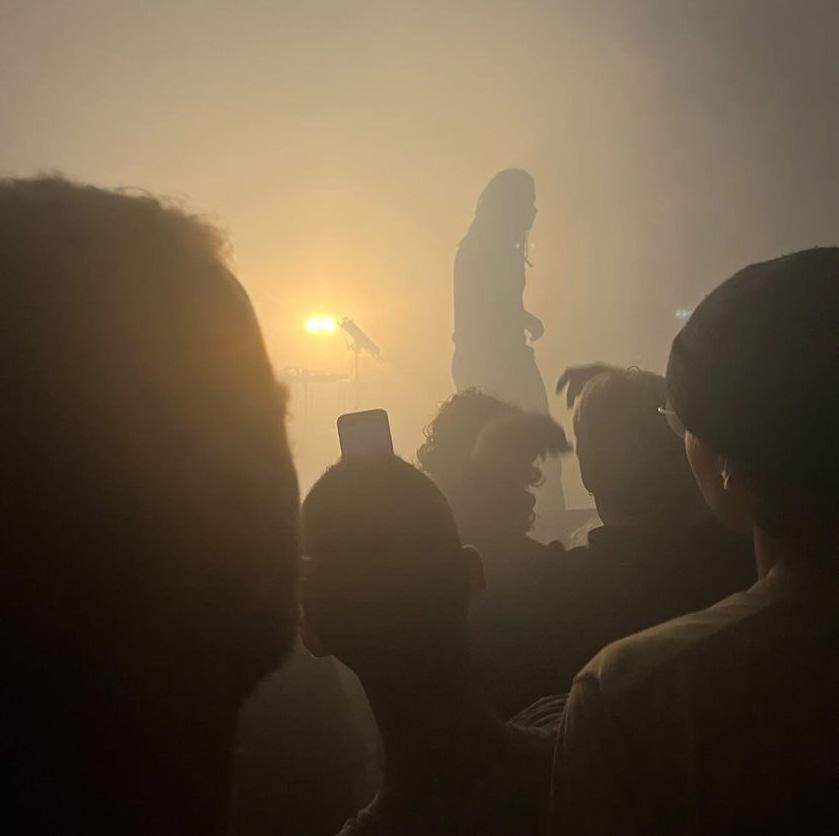


Catch and Release
by SANA AGARWAL &
illustrated
by FRANCESCA CORNO
Lately with every sunrise it feels like I am resurrecting parts of myself like my esh is sewing itself back together with bloody threads from being cut through with a butchering knife like sacri ce on god’s will
I remember my friends rushing, hugging the way they chop a bell pepper sideways or stir their tea
I know how one of them holds my hand September has felt like baptism
a er many seasons I resemble owers blooming in a eld and not the ones withering over a grave

I am well and alive,my organs are no longer turning into rocks heavy enough to put me in a casket
It is cathartic
e weather was both stormy and bright with some sun that fell perfectly on my face and I was half sunlight
It is always the little things
I’ve stopped trapping myself in my own brain like a prisoner mapping a cell because sometimes life makes you feel like the world is the size of a st and you’re crushed inside it

Mermen on the Shore
by SALLY ZHANG
& illustrated by ANOUSHKA GULI
It was in 1921, a er the May Fourth Movement, that a Chinese poet studying abroad pondered the dark reality of his homeland at that time. Looking at the moon, he wrote these lines: “Will there be Jiao Ren on the shore, weeping pearls at the moon?”
e Jiao Ren, translated as Merman, is a supernatural creature in Chinese mythology. Recorded for the rst time in the book In Search of the Supernatural in AD 350, this mythical creature is thought to exist in between the sea and land. More precisely, the story goes: “Beyond the Southern Sea there are mermen who live in the water and resemble sh, but they can weave and spin, and when they weep, their tears turn into pearls.”
I wonder if the poet writing these lines long ago imagined himself in a foreign land as a merman sitting alone on the shore at night, weeping? At home, there are young people like him ghting bravely against the corruption of the government authorities, and while he knows that they will lose in the end, he is unsure of his next action. e poet is not brave enough to leap recklessly into the ocean, swim to the bottom of the sea and join the revolution. Instead, he is on the shore, weeping. Nonetheless, when he wanders through mainland society during the day, he whispers angrily about the injustices at the bottom of the sea. He must have felt alone. the people on land have their own a airs to tend to. Not many of them care. And even if they did, what could they possibly do? Even the mermen are just whispering complaints and stare at the sea but do not dare to leap into it.
I have seen videos online of Russian activists shouting anti-war declarations in squares and being taken away by the police before they can even nish their sentences. I shed very “kitsch” tears when I saw it - as Kundera would say - and in the end, it was probably just a contrived performance. I wonder if the tears of the mermen and the poet are like that.
and I think a lot about the world and my trivial spot in it, I sleep every day with its breath against my spine how all of this is cosmo politically mundane, how the world has bigger sorrows than me, I remember and it matters
i’ve learnt that i don’t have to be the best to be happy i’m practising returning to the family i’d half forgotten When I think about my mom I think about how much love the world holds and how so much of it is in my palms I can even talk to my dad without my gut dropping it feels like leaping over barbed wires because all my life I placed myself on the other side of the border and him in the battle eld
I feel gleeful many times a day now, i smile and i mean it, i hug and it heals me, i sleep and i’m happy it takes me back to when I was seven and cradled in my nanu’s lap
I love the way I make my eggs and sometimes I see cats around that remind me of how mine sleeps in the cup of my chest
I saw my favourite artist the other day with my best friend and I stopped to notice that i was so alive with adrenaline gushing in my veins I didn’t know healing could feel so explicit but I promise you something in my chest is so ening My shoulders are relaxed more o en now and my hands don’t shake when I do my hair
I know now that for every day I have forgotten to live ere are still more where I have remembered my body is nally warm enough to feel like home and my heart healed enough to stop aching
Do mermen on the shore - like the poet a hundred years ago - not know where they can nd peace of mind? ey might nd themselves surrounded by exotic lands and the sea. But they still dream of home. A home which is enveloped by thick black mist that takes away the voices of the mermen who lived there.” Now mermen on the shore are either forced to speak a language they are unfamiliar with, live in exile in a strange human society, adapt in silence to the new darkness at the bottom of the sea, or to engage in fruitless rebellion. None of these options will bring the mermen inner peace. ey do not know which is more important. Is it the voice of a mermaid sold to a witch, or the landscape of home that is sorely missed? To be continued ...
To read the full article, head on over to our website!

Christmas Lights: My Personal Medicine for Seasonal Depression



 by ISHIKA SRIVASTAVA
by ISHIKA SRIVASTAVA
‘Christmas time is here, time for joy and time for cheer’ - except picture this sung in the high pitched voice of Alvin from Alvin and the Chipmunks. Growing up in India, a large amount of my exposure to Christmas traditions came from where most self respecting children get it from - Hallmark Christmas movies. My favourite part of these movies was the hopelessly illogical plot which always seemed to work out for the main character in the end. Seven year old me learnt a lot from the media - from mistletoes mentioned in a Justin Bieber song to the Rockefeller Christmas tree from Home Alone. However, these artefacts of American so power failed to capture one essential element: Christmas lights.
Where I grew up, Christmas traditions looked slightly di erent. My neighbourhood of Bandra in Mumbai has the highest concentration of churches in the world ( even compared to the Vatican). is meant that Christmas lights lit up every nook and cranny. What made every twinkling light all the more special was they were the product of individual creativity and e ort, rather than a mass project undertaken by the city. Walks around Mumbai during
From our Black Out Poetry Workshop

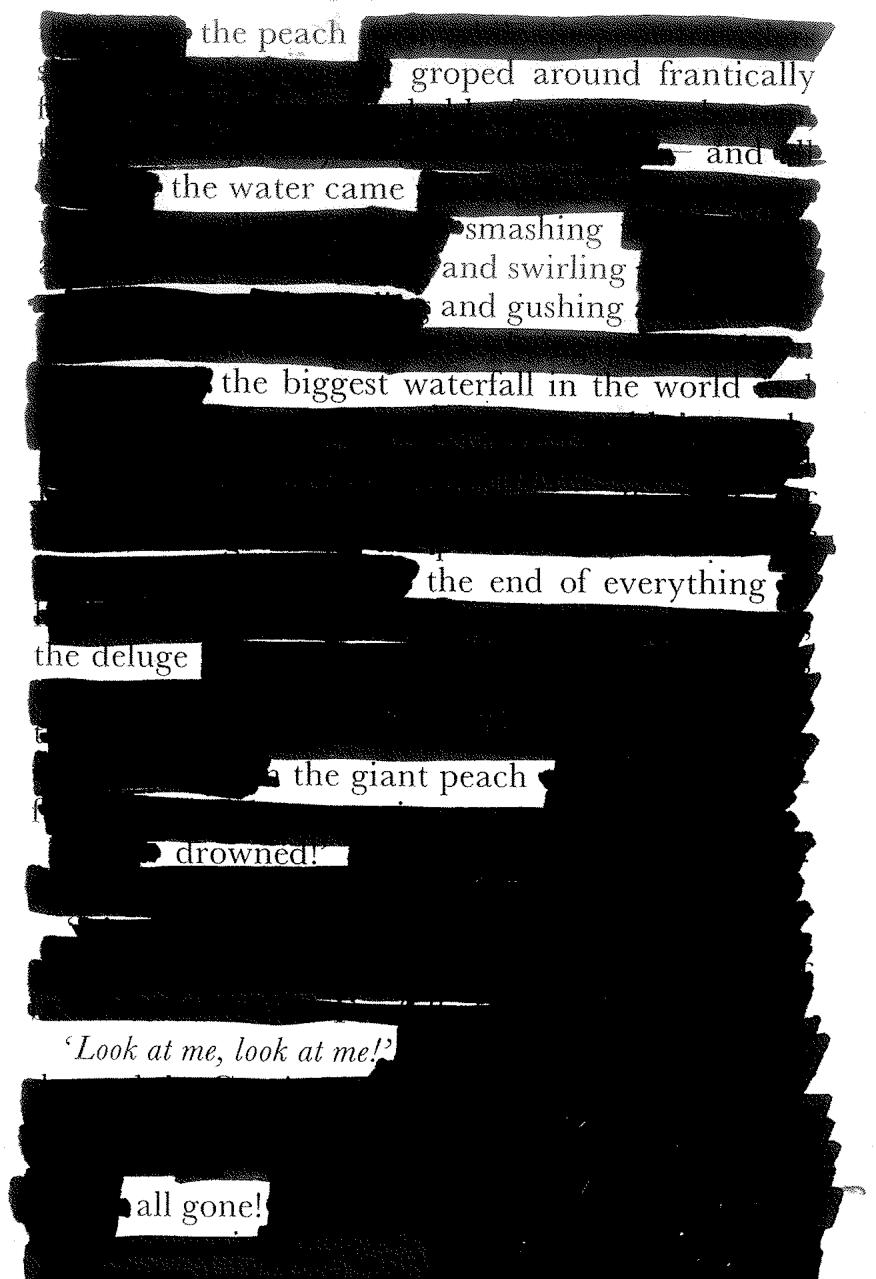

December are quite di warm enough to walk around in shorts, but the occasionally chilly sea breeze makes hot chocolate a welcomed drink. In my own family, we kept the lights up from Diwali in October all the way down to December.
In recent years, my mom makes sure that every time I come home from university I’ll have lights waiting on me, just so that I can feel special. While it has meant that strangers have knocked on our door wondering if there is a wedding upcoming because of all the festive lights, it’s a misconception I’ll happily accept. e lights are some of my favourite parts of this time of the year, giving a sense that there is always something to celebrate - despite the cold, despite the wind, despite the darkness.
I don’t think I’m the only one who feels like this. On 28 November, a crowd gathered outside the Centre Building to watch as the Christmas tree lights were switched on. e momentary joy felt by the cold students su ering under the weight of deadlines was tangible. And in that moment, at least for a second, we all stood still and smiled.
SPORT
EDITED BY NOAH POLL AND ALEX BOWLEY
LSESU Kabaddi wins London Zone Championship 28 - 24, beats King’s in fnals
Our victory as the champions of London Kabaddi is a story of immense resilience and determination. Losing our opening game to the league favourites, King’s College London, we progressed the rest of the championship unbeaten. And in a glorious retributive game, we beat King’s in the nal of the tournament.
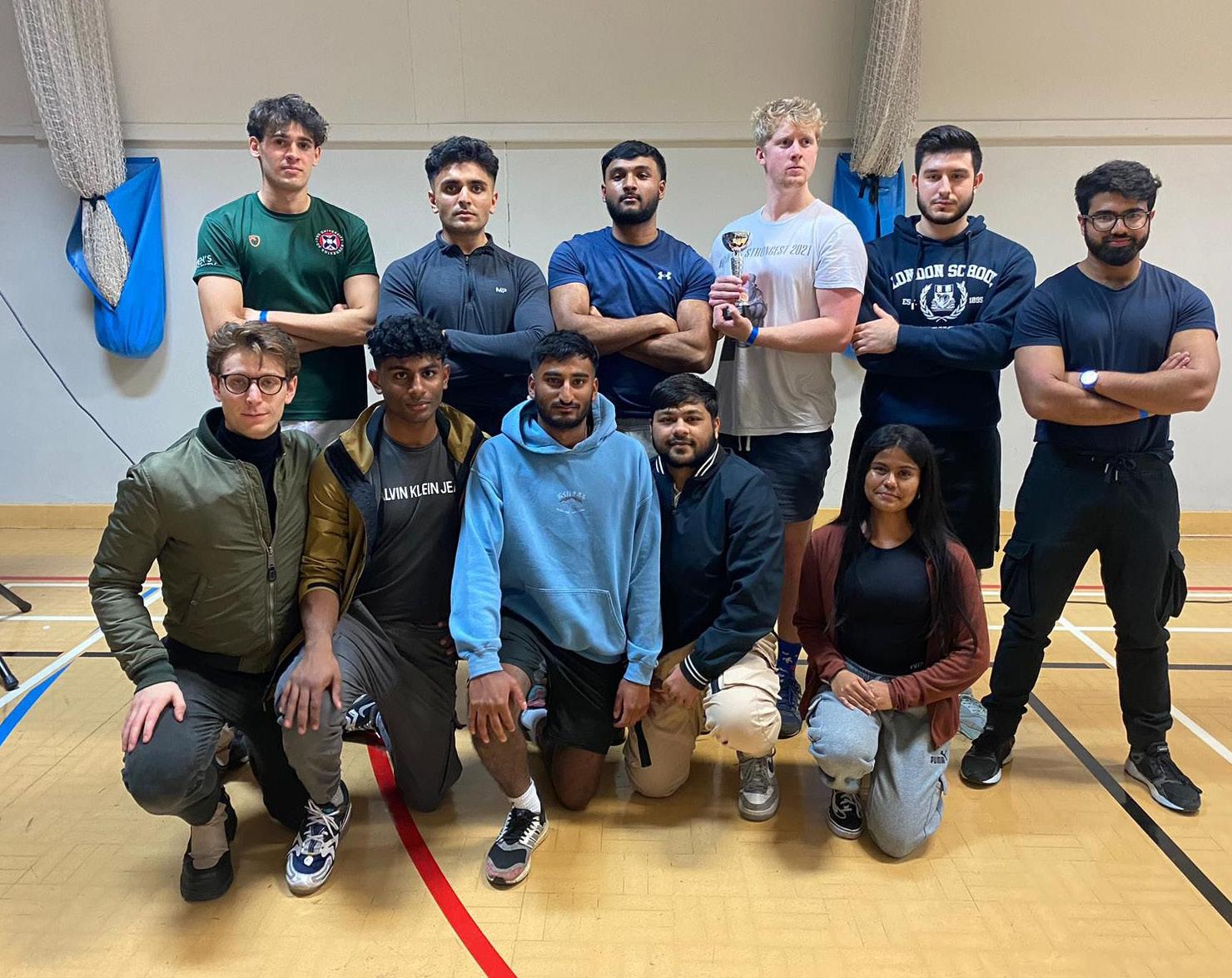
None of our players had played Kabaddi prior to coming to the LSE. With 3 of the rst team being freshers, we were very much the underdogs in the tournament.
With the guidance of our coach and LSE alumni, Tom Dawtrey, we were able to pick ourselves up from the opening game with inspired performances against a much more experienced Imperial and Kings team. Our opening raider, Milan, scored the highest points in the tournament with a 5-point raid in the nal. Enayeth, a rst-year team player, showed great bravery as one of our star defenders winning 2 all-outs in the nal. Captain Felix scored important points in the nal, with the nal score being 28 – 24 to the LSE. In the backdrop was our Welfare O cer, Britney, who ensured our team was in high spirits. We did not give up!
by the LSESU Kabaddi Team
An unpredictable World Cup: teams, players, and narratives to look out for
by ROBERT KHANJIAN & illustrated by CHARLIE TO
is World Cup in many ways feels very di erent to any we have experienced before. It is held in the winter for the rst time ever, seen by many as disruptive to the European club football season – but is also the rst World Cup to be hosted in the Middle East.

With that being said, there is some incredible football to look forward to at this World Cup. If you haven’t had the chance to catch some of the earlier games, or perhaps feel out of touch with the tournament – this article is for you. ere is a lot to be excited about.
South American favourites?
Has the balance of power in international football nally shi ed back to the South American continent? Before the tournament, Brazil and Argentina were heavily backed by bookies and experts as the favourites for the World Cup, yet the results of their rst matches tell very di erent stories.
Argentina were on a streak of 36 games undefeated since 2019. In Lionel Scaloni they have a manager who won them the Copa América last year and seems to have nally built a balanced team that plays to Messi’s strengths. One lacklustre performance in the historic upset against Saudi Arabia later, Argentina sit bottom of their group, with their hopes of a World Cup triumph looking bleak. Yet, with one of the greatest players of all time, Lionel Messi, and a host of attacking talent in Martinez, Alvarez, and di Maria, it’s impossible to ever count them out.
Brazil looked assured in a comfortable 2-0 win against a spirited Serbia side. What is perhaps most terrifying is that they clearly have more gears in them. Every World Cup winning side in recent history was blessed with incredible squad depth and this Brazil team certainly matches that trend. Every substitution makes their 11 look just as good, if not stronger. Neymar is, of course, the talisman of the side, but the “Seleçao” have shown that they are not short of goals from elsewhere too. ey possess a dynamic mid eld and arguably the strongest attacking lineup of any national team at the World Cup, allowing them to play on the front foot even against the top teams. ere is de nitely a lot to be excited about when it comes to Brazil.
How far can the African sides go?
Since the iconic Ghana side of 2010 that came within a Luiz Saurez handball of a World Cup semi- nal, no African team has managed to even get to the quarters. 4 years ago in Russia, none had even made it out of their groups. is year looks to be di erent.
Many would have tipped reigning African champions Senegal to go furthest out of the african teams, yet this year they are without their captain Sadio Mané. ey still are a side full of quality, such as Watford winger Ismaïla Sarr and a mid eld pairing of Idrissa Gueye and Nampalys Mendy. Yet only a win in their nal game against Ecuador sends them through to the knockout stage. Ghana have looked impressive, despite opening with a 3-2 loss to a strong Portugal side. e ‘Black Stars’ have a great mixture of youth and experience this year. Ajax’s Mohamed Kudus and Arsenal’s omas Partey look to be key if they are to progress past the group stage. Look out for some sparks in the Ghana – Uruguay match on Friday a ernoon.
Who are the dark horses?
e rst few games of the tournament have given us some surprises from very
unexpected teams. Ecuador look set to make it to the knockouts a er assured performances against Qatar and the Netherlands. Japan shocked the world, coming from behind to beat Germany 2-1. Canada too, despite a 1-0 defeat to Belgium, were entertaining to watch. Every tournament has its surprises and these three sides are among them. All of them have shown great tactical exibility, which allows them to pose a threat to even the strongest sides.
Another European crisis?
Reigning champions France and Luis Enrique’s Spain look the most assured of the European sides. Both sides have slowly phased out the older generations of players, with bright young stars carrying the hopes of their nations at this World Cup. Expect lots of goals from both sides and keep an eye out for Pedri and Gavi in the Spanish mid eld.
Portugal seem to nally have a squad of stars that could deliver Ronaldo the World Cup. Van Gaal’s Dutch side are full of youth, energy and I would strongly back them to go far this year. Germany and England have de nitely shown some positives signs, but cannot seem to grind out results against teams that are tougher to break down. Honourable mentions include Serbia, Denmark and Switzerland – all sides that can surprise many with their quality.
One last shot at the World Cup for Messi and Ronaldo, an exciting Brazil side, resurgent European teams, pleasant surprises and historic upsets. Yes, this World Cup is di erent, it is unusual. e football has been incredible and there are so many teams, players and storylines to be excited about. Make sure to catch the games at the ree Tuns or watch for free on BBC and iTV. We really are in for a treat.
e LSE World Cup
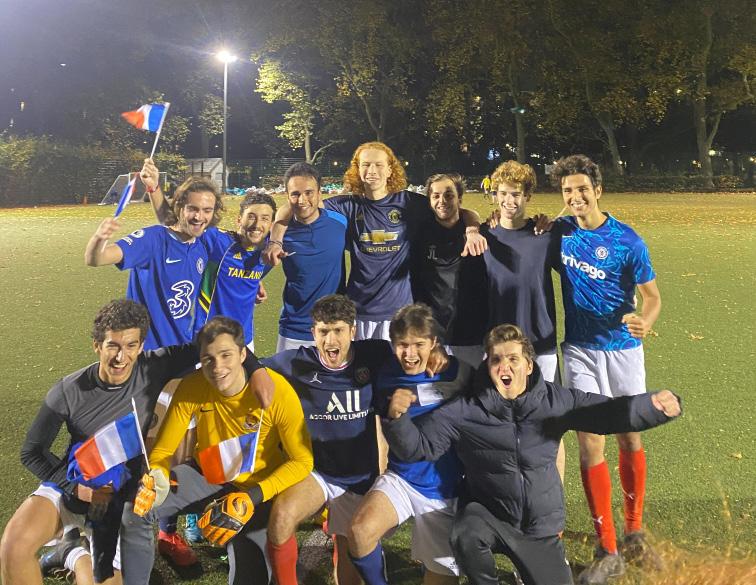 by EMMA SOMOS
by EMMA SOMOS
‘Football is life’ – that’s how I would describe the atmosphere on Coram Fields. With the 2022 World Cup coming up, four LSESU societies hosted their own tournament. I arrived at the Italy vs Spain match, and the Italians wanted to prove that they deserved a place in the World Cup – even though their national team couldn’t qualify for the past 8 years. e Italian team beat Spain 1-0. A erwards, France lived up to the reputation of their world cup defending champion national team beating the Germans 3-0.
e “World Cup feeling” clearly arrived at LSE, but did the human rights concerns come along with it? Many media outlets in Western countries reported the huge human costs that made it possible for Qatar to host the World Cup. Investigative journalists covering the issue of labour rights in Qatar in the past 10 years revealed that 6,500 migrant workers died due to poor working conditions and forced labour in Qatar since the country was awarded hosting rights (Guardian, 2022).
While ree Tuns is showing the World Cup games, the SU issued an accompanying statement encouraging donations to charities supporting LGBTQ+ rights. e LSESU LGBT+ society shared a post saying that they “don’t disavow any student” choosing to watch the World Cup, however encouraged
students to be aware of the complicity of FIFA in supporting a government that criminalizes homosexuality. In light of all this, I reported on if LSE students will boycott the World Cup. Is football still ‘life’ when it can cost human lives?
Interestingly, there was a gender divide at LSE. When I asked about students’ views on the Qatari world cup, girls were more likely to say that they will boycott watching the games. Some highlighted how there is not enough attention given to gender in football – speci cally the pay gap. However, there were also girls who said they don’t usually follow football, so it won’t be a big sacri ce on their part not to watch. With boys only a few Italians said that they will boycott the world cup – partially in uenced by the fact their country is not involved. ree male students said politics and sports should be separate.
I’ve heard many meaningful points regarding boycotting. Many men distinguished between watching matches on TV versus travelling to Qatar. An American girl said that individual boycotting is not e ective and misplaces the responsibility: it is not the fans who allowed these conditions and who will pro t from the world cup. Many students echoed this by questioning why big brands haven’t pulled their sponsorships.
A French guy highlighted his support for the Le Quotidien newspaper which refrains from covering the World Cup. An Italian student forced me to re ect on my own position writing about the world cup, “ e more you talk about it, the more attention Qatar gets.” On the other hand, someone told me that the media should highlight what is happening – both questioning where the ne line is between the responsibility of human rights reporting vs indirectly supporting an oppressive regime.
Some suggested that countries (especially Muslim countries) shouldn’t change their culture for the World Cup. is is a point which can help us think why and how the West could position itself outside of such moralisation. Someone brought up the hopeful notion of how the ‘internationalisation’ of Qatar can bring democracy to the region, but I must ask: was it not internationalisation –the embeddedness of Qatari stakeholders in the football industry – that brought the World Cup to Qatar in the rst place?
A er Qatar announced the no alcohol policy at stadiums, LSE students were guided to leave the pitches by Coram Fields security a er receiving complaints regarding children training next to students smoking and drinking. No beer in Qatar, no beer for us. Football really unites. Luckily we were allowed back on the pitch for the last game: the nal between Italy and France. e French team became LSE World Cup champions beating Italy 1-0. e captain of the French team hoped that this win encourages their national team to take home the real trophy!
We shouldn’t give up on the uniting power of football. In a time when there is increasing recognition that football is intertwined with business and politics, LSE students lived up to their reputation of learning to become critical social scientists who also have a so spot for the game. But football is more than just a game. Football is life.
Deji vs Floyd Mayweather, and the youtube boxing hype train by ALEX BOWLEY
On the 13 November, Floyd Mayweather beat Deji Olatunji when the referee called o the ght in the 6th round, giving Mayweather the technical knockout and the win. e ght turned out as expected, with Mayweather dominating the YouTuber-turned-boxer, Deji. During the ght, Mayweather was seen interacting with the crowd and taunting Deji’s corner. e ght came to its end when Deji did push-ups between the rounds, inciting Mayweather to deliver a combination of quick punches forcing the referee to get involved.
Now, despite the result of the bout being all but decided since the ght was announced, there were multiple subplots that were brought to the fore during the ght. Firstly, this ght was the rst to be streamed in Zuckerberg’s Metaverse. Secondly, it was another example of the success of YouTube boxing.
Read the rest of this article online on e Beaver website.
SIMON COADY AND ALPHA BOOKS
SIMON COADY AND ALPHA BOOKS
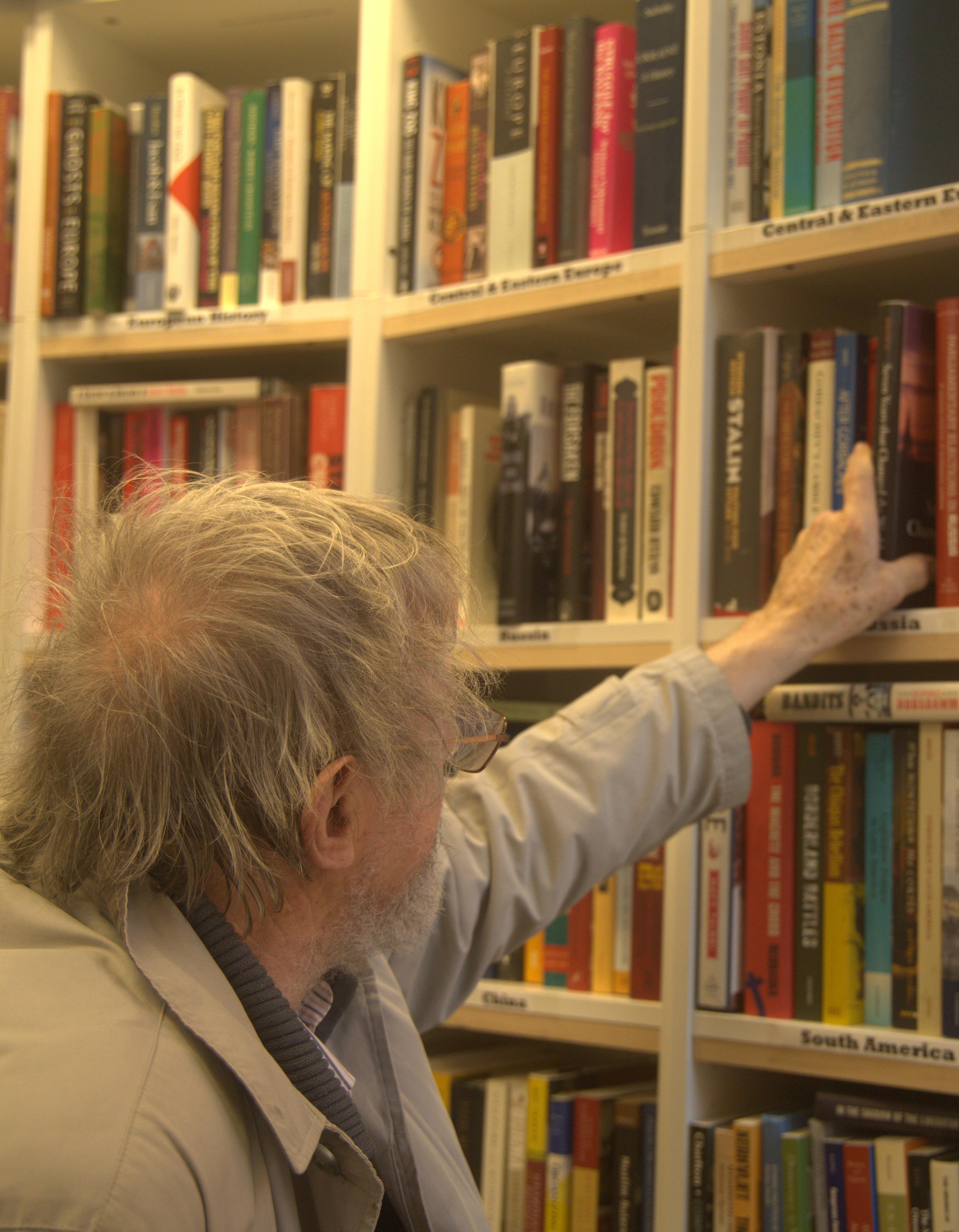
25+ years in the making
25+ years in the making
interview by AMBRE PLUTA photography by OLUCHI EGBOM
interview by AMBRE PLUTA photography by OLUCHI EGBOM
Every morning without fail as I arrive onto campus, I see Simon slowly setting up the bookshelves and tables outside Alpha Books. Once he is done setting up the shop, he takes o his coat and hangs it on the front door. A truly comforting and never-changing ritual, one that symbolises the warmth and joy that Alpha Books brings to LSE. With this interview, I am excited to tell you the story of Simon Coady and Alpha Books, our beloved second-hand bookshop on campus.
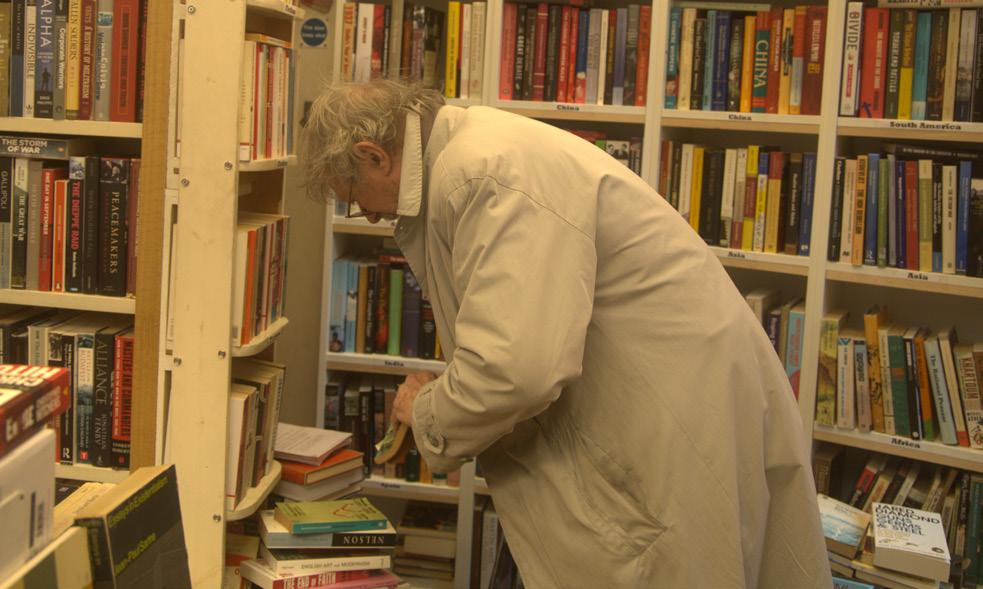
There is something quite magical about entering Alpha Books. For a few minutes, you get to forget the stress of university, essays, application deadlines, and the pains of becoming an adult.
While we took pictures for the interview in Alpha Books, I interviewed Simon in George IV, the postgraduate students pub instead. I was told many times that if I did not see Simon at the shop I would most probably nd him there. He seemed to know everyone, and as I arrived for our interview, he was having lunch there.
Alpha Books has been a xture of the LSE campus for nearly 26 years. It began as a pop-up stall in the now-destroyed East Building. Simon explained that the putting up and taking down the stall took a lot of work, “It began to drive me crazy. You have a fantasy that you open the shop door and put the lights on. at was not the case.” A er three years of doing that, Simon asked the SU if he could have a shop on the mezzanine oor of the East Building.
at is when Alpha Books rst became a permanent store. However, it was quite hard to nd. It started o badly as people wouldn’t go up there. “People would ask ‘What kind of shop is it?’ I would go, ‘Isn’t it obvious? It’s a bookshop.’”
A er 19 years of Alpha Books being in the East Building, the building got demolished. In early July of 2015, the bookshop upgraded to its current location on the corner of Portsmouth Street. “I have to say, I’ve always had a good feeling about the SU. ey are the reason I got a call from the architects about the bookshop. I had been there many years. But I thought that was the end of everything. But thanks to the SU of that year, it was only the beginning.”
e bookshop is now in a much livelier area of campus which attracts more foot tra c. Simon explained that he now gets three primary audiences: the students, the lawyers on their way to the Royal Courts of Justice, and tourists.

e bookshops follow the passage of time at LSE in a way no one else does. “ ere is a most denite LSE rhythm which follows the seasons. And there is an enormous stretch within the summer term comprising exams and summer school.” Simon explained a noticeable degree of insecurity in the post-exams period, which is why there is an appetite for escapism, ction, while “some uncertain future looms.” Alpha Books o ers both ction and academic texts. “ e ratio between the two changes, but I would say that ction is an essential sideshow.”
“Sometimes I liken to customers that they should think of [Alpha Books] as a beam from a lighthouse. A lighthouse beam sweeps across an area, so customers may nd some things they need.” Simon also tried to stock books that students ask
for as it increases the variety of books and authors sold in the bookstore.
Simon mostly hires students from LSE to work in the bookshop. He likes to hire students, except for rst years. “ is is no prejudice really, they get swamped by their work a er four or ve weeks. ey realise they all want to do work here but haven’t got the time.”
Simon has a long-running rapport with the student body and is a beloved gure on campus. I spoke with two students who work at Alpha Books: Sierra Herring, a third-year student in Geography, and Madison Weisend (see picture), a postgraduate student in Environment and Development. ey were both very enthusiastic about working with Simon, explaining how he randomly quotes Hamlet, goes to used-book sales on weekends, and has created a lovely atmosphere at the bookshop. Sierra explained that “he’s very accommodating and actually very caring. It feels a bit like a bookshop family, I like it.”
Simon praised the initiative and enthusiasm of students, “ ey’re easy to be with, funny to be with and they get the work done. ey’re very industrious, and sometimes have good ideas. Not o en, but sometimes.” He added that the reason Alpha Books has managed to survive is the adaptability that they have shown: adapting to the weather, to new locations, to new expectations, and to changes in the courses at LSE.
Simon explained that now that Waterstones is gone, there’s more expectations placed upon Alpha Books, which is sometimes hard to meet. “I felt that even when Waterstones was here, and I was very sad to see it go. ey’ve been here for 30 years. ey had a big history.”
For Simon, there are two elements to second-hand bookshops. “It’s like a museum in the sense that it calls on past authors, authors long dead who produced important work. And on the other hand, there is trying to stock newer authors and more current contemporary thinkers as well. So, there is both the past and the present.”
Simon added something that personally made me very happy. “I’m always pleased to stock a small percentage of early or rst novels by contemporary writers.” He explained that despite being a place that relies on classics, it’s very important to introduce rst novels.
“It’s important for the sake of writing for the present and into the future.”
“New writing is risky. New writing is like the salmon swimming upstream. It’s di cult. A lot of work goes into writing of any kind. And so if we can, occasionally, as we can’t do it very often, introduce unknown contemporary writers, it’s great.” Simon explained that people gravitate towards books with names that they know. If he can get them o the beaten track and sometimes try a new writer, it can be quite interesting.
“It does have risk, but it should be a risk that we encourage in an increasingly monetized culture. A monetized culture is not necessarily the best friend of real innovation.”
“My mother thought up the name Alpha Books. She was a great crossword puzzle-doer and wordsmith, she loved language.” As Simon spoke fondly of his mother, he explained that she was amused by the use to which we put language, which is a trait he believes to have inherited. “Language is mutable, it changes. It’s something quite special.” When his mother o ered the idea of Alpha, he thought that it was great. “It’s got a great connotation and it’s the beginning of the alphabet. If you shop and come anywhere near Alpha books, perhaps your chances of getting a rst are increased.”
As we reached the end of our conversation, Simon explained that his main goal now going forward is seeing the shop go on. “I think we’ve been here long enough to make our case.” As I asked if he sees himself continuing to work for a long time, I could see the determination in his eyes as he answered “I am. Much of my life has been spent here. And I’m very fond of the LSE for all sorts of reasons. It’s been very good to me and it’s been very supportive of me. I can say to you two things. I continue to oat face up. And as to my continuing here, I can only say watch the skies.”
Interview by Ambre Pluta, Flipside Editor


ISSUE 924 MT WEEK 11 2022 REVIEW SPORT SOCIAL PART B the crown LSESU Kabaddi team wins best christmas cofee blackout poetry SIMON COADY & ALPHA BOOKS 25+ years in the making SIMON COADY & ALPHA BOOKS 25+ years in the making












































 Vanessa Huang Staff Writer
Illustrated by Lamisa Chowdhury
Vanessa Huang Staff Writer
Illustrated by Lamisa Chowdhury





 Alina Chen Opinion Editor
Illustrated by Noora Belcaid
Alina Chen Opinion Editor
Illustrated by Noora Belcaid









 Anya Saund
Anya Saund

 EDITED BY BEN HELME AND SYED ZAID
EDITED BY BEN HELME AND SYED ZAID



 Image from e New York Times
Illustration by FRANCESCA CORNO
Image from e New York Times
Illustration by FRANCESCA CORNO






 Images courtesy of Drama Society
Images courtesy of Drama Society



 By Hila Davies & Illustrated by CHARLIE TO
By Hila Davies & Illustrated by CHARLIE TO

 By RACHEL PONTING & illustrated by IGA JASINKA
By RACHEL PONTING & illustrated by IGA JASINKA











 by ISHIKA SRIVASTAVA
by ISHIKA SRIVASTAVA





 by EMMA SOMOS
by EMMA SOMOS

























